#It's not quite textually a love triangle
Text
Horatio and Ophelia are never confirmed as being in a scene together, and do not share so much as a single line of dialogue.
#hamlet#ophelia#horatio#shakespeare#I think sometimes about the (lack of a) dynamic between these two characters#They're probably the two people Hamlet is closest to#He loves them both (yes he *does* love Ophelia even though he is undeniably shitty to her)#They both love him#It's not quite textually a love triangle#but knowing about Shakespeare's real-life queerness makes me more inclined to read the homoerotic subtext in his work as deliberate#Because we never see them on stage together we never see them directly compete#But we also never see them connect. Collaborate.#Commiserate about the maddening madman they love and the hardships they must witness being inflicted upon him.#Or their own troubles--the dutiful daughter always ordered about. The untitled scholar perhaps looked down upon#Think of it like this: Both Horatio and Ophelia try‚ in their ways‚ to save Hamlet#And they both fail#Could the two of them working together have altered the path of fate?
103 notes
·
View notes
Note
Hiii, I really love your ATLA analyses. I'm genuinely interested, what can you say about this take? I mean, it sounds pretty logical, and I'm really interested to know what objections there might be to that view of EIP?
https://www.tumblr.com/writer-rider-dirty-thirties/744225630324965376?source=share
There's a few main things that meta like this one, I think, miss out on. That said beyond the two paragraphs I'm not really discussing their meta in particular. Everyone's entitled to their opinion, but it does play into why I think EIP gets blown out of proportion while ignoring the more... grounded subtext there? Which is what the rest of the meta response here is about as follows. Please refrain from sending me specific metas in the future - discrediting other people's work is not what I'm about, even I don't necessarily think it's always well argued.
They acknowledge the Doylist perspective... and then completely ignore the actual, textual Doylist perspective they have going on. The writers' intent was to, very evidently, use Ember Island Players to acknowledge their own and fans' reactions to the show (which is why the Great Divide, an episode that the writer of EIP wrote, gets the shaft in the play) by exaggerating and making fun of their own characters and plot points. Grounded in their portrayals yes (Katara does indeed make speeches about hope) but so heavily distorted; just look at how they portray this Katara and Jet, who are completely remorseless about drowning a town ("Oh Jet, you're so bad~").
But the distortion is key. The play pretty glaringly says "Canon Katara would never like Zuko" or vice versa, "because to do so would be a great distortion of her character and characterization." Furthermore, for Katara to only see Aang "like a little brother, and that you don't have feelings for me" is also a distortion, which is why Katara outright states on the balcony, "I didn't say that. An actor said that". It's also worth noting I think that the play itself also erases Aang's romantic feelings for Katara ("I wouldn't want it any other way!"). He doesn't make his feelings plain and be rejected in the play; they just don't exist. So even the play itself isn't saying that there's a love triangle, they're saying that a distorted version of these characters would feature a Katara and Aang that don't have feelings for each other, and a Katara and Zuko that would.
Now, I don't think the play is meant to be that dismissive of fans, either. Like I said - it's meant to poke fun, and the ZK faction had always been quite large and vocal. The crossroads of destiny and its associations with Oma and Shu (which serve the basis for Kataang's love theme) are the bulk of what the ship tends to stand on, 'canon' wise. It makes sense if you're going to do a ship tease with them to do it there, and it's also the last instance you can really make actor Katara 'like' anyone.
It's also a misread to assume Aang would get this angry over jealousy, as well, given that Katara was very obvious with Jet both times, and Aang was very sparingly jealous in Book 1 and only slightly so in Book 2. EIP is one of the rare instances where Aang projects onto other people, a trait more usually seen from his friends.
What makes him upset - and we Know this, because he repeats it outright when they actually Talk about it - is this exchange between actor Katara and Zuko:
EIP!Zuko: I thought you were the Avatar's girl.
EIP!Katara: [Laughs] The Avatar? Why he's like a little brother to me. I certainly don't think of him in a romantic way.
That's what makes him potentially upset, which fair enough: it can be upsetting when someone doesn't like you back, especially when Katara previously has given plenty of indications that she does. But he's not mad at her on the balcony. He doesn't take his frustrations over her not seemingly returning his feelings out on her. He's mad because Katara can't, or won't, give him a straight answer.
Aang: You said that I'm just like a brother to you, and that you didn't have feelings for me.
Katara: I didn't say that. An actor said that.
Aang: But it's true, isn't it? We kissed at the invasion and I thought we were going to be together, but we're not.
Katara: Aang, I don't know...
Aang: Why don't you know?
AKA "if you don't like me, which I just gave you a perfect out to acknowledge, can you at least confirm it for me?" And she won't even do that.
Katara is usually a very openly emotional person, which is why when it comes to whether she has feelings for him or not (and he has very good reasons to think that she does, given if you remove the Aang's POV we see, Katara is wayy more obvious with her affection than he is), it's accordingly frustrating that she won't just come out and say it. When does someone like Katara hold back? Well... normally when she's concerned about Bigger Things (i.e. not initially pushing with Pakku because Aang learning waterbending is more important to her) or when she's not sure what to do (when Aang rejects her comfort in The Serpent's Pass).
Conversely, his feelings for Katara also makes Aang more likely to stop evading or dodging and to stick his landing. He's the one who tries to confess on two different occasions. He's the one who kisses her first. And he's the one who wants to actually discuss their relationship now. (These are all reasons why I think, if they ever did break up, Aang would actually be the one with the guts to say it out loud, just FYI.)
Alternatively, if we wanna talk about Framing, let's talk about the actual balcony scene, namely Katara's dialogue, and the placement of the moon:
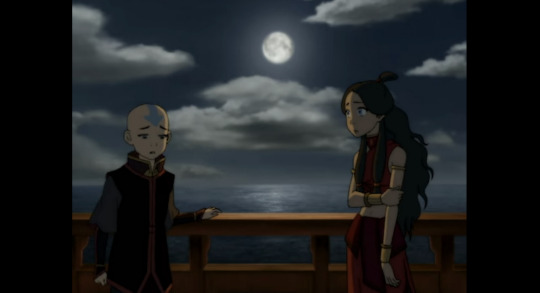
Not only does this balcony scene take place on a balcony like their infamous finale kiss, with parallel framing of Katara walking up behind Aang and seeking him out to talk (if Katara hadn't approached him, it's likely neither would've happened either time) but like
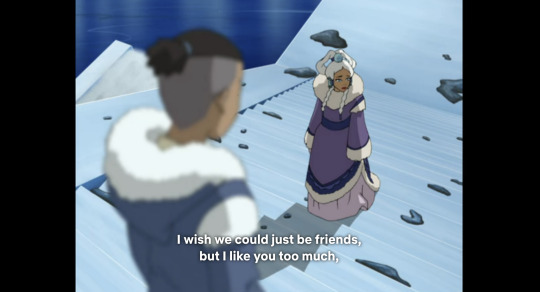
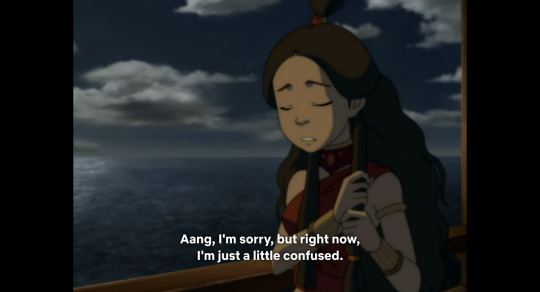

When Yue finds herself in a similar situation with Sokka - a young man she loves, has kissed, but finds herself unable to be with for a variety of reasons - she says almost beat for beat what Katara says here about her feelings and reasonings for wanting more distance. But like both Yue and Katara say, there's more important things going on:
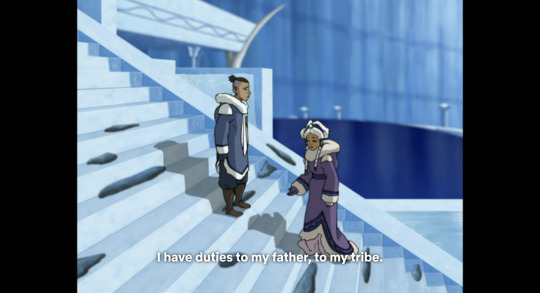
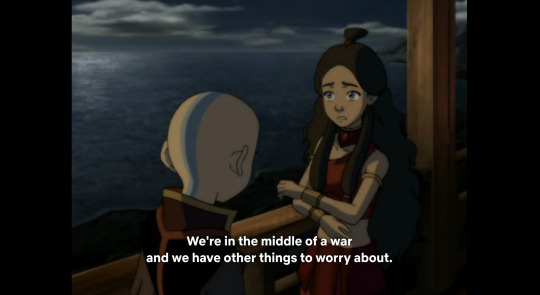
I say this because everyone ignores the aspect of Katara's bond with Aang that is informed by her own trauma and fear of losing people. Aang kisses her because "What if I don't come back?" Katara literally watched him die and brought him back to life. She watched her father mourn her mother and Sokka mourn Yue (The Swamp), which the play likewise gives her an ample reminder of. She watched Jet die too. Katara has faith that Aang will be different ("I knew you'd come" from CoD and "He's gonna come back; he has to" in Sozin's Comet) but that doesn't mean she's not scared. Everyone else going on is complicating her feelings for Aang, and that's perfectly valid -- but like I said, it's a 1 for 1 with Yue.
Which is why she kisses Aang first after the war, on another balcony, because now it is the right time.


This isn't even touching on the in-universe canonical reading of EIP being Fire Nation imperialist propaganda, but that's a meta for another day.
Not to mention: EIP also teases Zukaang through Aang and the Blue Spirit, has them similarly react in distaste, you can equally read Zuko wanting to sit in between them as wanting to sit next to Aang, and Zuko and Aang's dialogue is a lot more ship teased in canon, Anyway.
June: What happened? Your girlfriend run off on you?
Zuko: It's not the girl I'm after. It's the bald monk she's travelling with.
Zuko doesn't even correct June for implying a romantic connection, only who he's looking for (love you Avatar "Zuko I want you to dance with me" Aang).
I also personally think that basically any episode that has 'strong' Zuko-Katara subtext actually has far stronger Zuko-Aang subtext, but that's a meta for another day.
I do always think the ZK fandom is a fascinating example of what can happen to a fandom when they only have maybe 5 episodes to work with, nor does ship teasing make something implied canon, otherwise The Dragon Prince (also created by Aaron Ehasz) would have a very different endgame ship (to the point that every Soren/Rayla shipper I've seen also ships ZK, funnily enough, because neither of those are remotely canon).

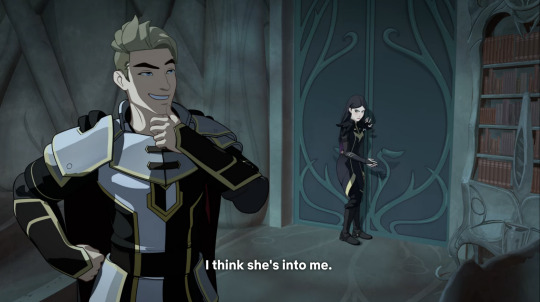
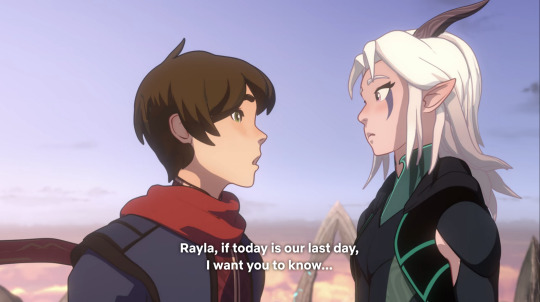
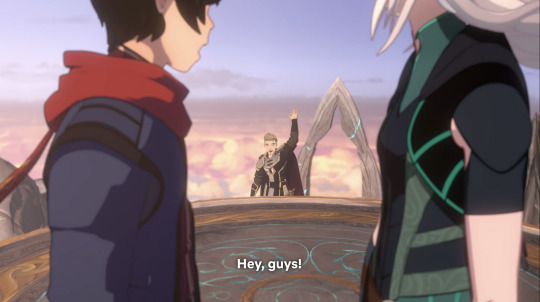
People have gotta stop taking the bone they're thrown and acting like it's a feast.
#antizutara#atla meta#thanks for asking#pro kataang#atla#analysis series#kataang#otp: penguin sledding
34 notes
·
View notes
Note
You're really dumb and don't understand Betty is part of a 3 song love triangle??? Or that taylor never wrote a love song to a woman who borrowed her lipstick? It's funny You're a gaylor again when I thought you grew a brain. Can't wait for you to go back to your kaylor era while taylor remins exclusively sucking dick, saying she is not lgbt, being asked by her friends what sheddo to her gay son because she comes off a bit phobic clearly in real life, calls her self an ally and you grasp at straws of her writing a reply song from the man's pov akakakakaksk
Bestie idk what the fuck any of this means. Like literally your level of illiteracy astounds me. If I were you, I would delete Tumblr, forget about sex (good grief I hope no one ever fucks you because accidents happen and the chances of you having offspring are quite frankly terrifying) and focus on this:
*I* think Betty is from a guy’s perspective. That’s literally the only way I’ve heard it. Taylor also thinks that. However, if someone else hearing it differently makes them happy WHAT THE ACTUAL FUCK IS WRONG WITH THAT? *I* think Taylor meant Dorothea from a boy’s POV but I like imagining it as a girl. And so what? *I* know Diet Mountain Dew by Lana was written about a man but I like to imagine it as about a girl and textually it’s easy to do based on “never was there ever a girl so pretty” idk. You understand Taylor or Lana’s intentions don’t affect our thoughts? And our interpretations don’t affect Taylor or Lana??? It’s INTERPRETATION.
Fucking chill bruh and LEARN TO READ. If I get a follow up I will block but this was SO DUMB and unpleasant I felt the need to respond.
Also why are you talking about borrowed lipsticks? In Dorothea the narrator says they’d buy lipstick from her - which could be like “I’d even buy lipstick FROM YOU even though I don’t use it” or could be like “because I also use it.” You can hear it any way you want.
All these songs are fictional so why the FUCK are you even mad and what the FUCK does Taylor loving dick have to do with anything??? Please fucking learn basic semantics or idk just get offline because being online requires knowing how to read and write.
2 notes
·
View notes
Text
The Great CLAMP Re-Read Part 4: Duklyon: CLAMP School Defenders
Part 1 (RG Veda) | Part 2 (Man of Many Faces) | Part 3 (Tokyo Babylon)
Where could CLAMP go from Tokyo Babylon? Let's go a bit backwards in time to their fourth work, Duklyon: CLAMP School Defenders. It ran from 1991 to 1993, making it concurrent with all the series mentioned in my past review, and in the same world as Tokyo Babylon (and X). It definitely feels like the real start of CLAMP's interest with shared universes, meta-textuality, and self-reference, because so much of this series is tied to your knowledge of their other work. Crazy to think that a gag sentai manga from the 1990s would one day birth Tsubasa.
Like Man of Many Faces, I had never read this or even knew it existed, it's one of the few CLAMP manga with no anime adaptations (it did have 1 drama CD). It's out of print and was released in English by Tokyopop in the early 2000s, in two volumes comprised of 13 chapters. I read this entirely online and like with Man of Many Faces, am not likely to ever get a physical copy unless I feel like completing my collection. "Spoilers", in the loosest sense of the word.
Synopsis: Higashikunimaru Kentarou and Shukaido Takeshi are freshmen students who lead double lives as masked sentai superheroes Duklyon, protecting CLAMP School from evil! Aided by the General and the fiery Eri Chusonji, they've got to fight the fiendish Imonoyama Shopping District from world domination (and also keep being main characters in their own story!).
The Story: Listen, this is a gag manga in the purest sense of the word. It starts off mocking the repetitive nature of tokatsu and kaiju shows like Ultraman, and I definitely found myself slogging through the first volume because satirizing repetition by being repetitive is not actually funny. Volume 2 improved things by introducing a wacky alien love triangle and more self-referential humour, which did manage to land. The manga can overall feel kind of random and aimless at times, and while the latter chapters do manage to pull things together, the earlier chapters really struggle to actually be funny. The satire isn't particularly striking or witty, it's meant to ~crazy and poking fun for people who are long-term fans. I'd rate this somewhere a little less than average. When it leans into breaking the fourth wall and mocking themselves, it lands. When it parodies Super Sentai by just...being Super Sentai, it's just a poor copy.
The Themes: There are no themes here. This is light and playful and silly and a way for CLAMP to poke fun at all the genres they like. I have learnt nothing from this and I think Takeshi and Kentarou would be proud of me.
The Characters: One thing I'm realising in these CLAMP re-reads is 1) the strength of CLAMP's character writing that elevates their weaker writing, and 2) how much they copy earlier character templates into newer characters. Takeshi and Kentarou are prototype Watanuki and Doumeki "stop saying we're close but actually they're in love (probably)". And it is charming to experience the second (first?) time, especially the flash-forward at the end where they're married (almost). I love Takeshi's grumpiness and frequent fourth wall-breaking. Sukiyabashi is pretty charming as a fail villain, and lovesick Eri is hilarious. There's nothing deep about the characters, but they're entertaining and hard carry the paper-thin plot.
The Art: It's competently drawn, comprehensible visual storytelling, and the detailing on the Sentai suits are pretty well-done (though something about how the codpiece connects to the legs bothers me anatomically). I do love the tokatsu villain costuming, but otherwise the character designs are quite plain. It was actually a little difficult to distinguish Takeshi and Kentarou at first. Like Man of Many Faces, it's fine, it gets the job done, but it won't change your life.
Questionable Elements: I do think it's funny this is the ONE CLAMP series where an adult person-teenager relationship is treated as gross, and it's (so far) the only one where the adult is a woman and the teenager is a boy. Something something ageism misogyny. But otherwise this is pure fluff, I only noticed this because CLAMP and their penchant for....shall we say, questionable age-gaps, is notorious.
Overall: A silly diversion after Tokyo Babylon, I can see why Duklyon is an obscure CLAMP work. But where Man of Many Faces had sweet charm to really carry it, Duklyon treads the more fickle ground of comedy and it just doesn't always work. There's some genuinely funny moments here, and I probably will be thinking about Takeshi and Kentarou for a while, but I don't think it's a necessary read for anyone but the most dedicated of CLAMP fans. I enjoyed my time overall, but honestly - I think that's because the fandom makes Duklyon funnier than the actual product is. It's good enough, but that's about it.
0 notes
Text
has anyone done a gifset that’s just comparing izzy tearing up when ed chokes him/The Whole Toe thing?
i only ask because i need to stare at izzy ‘fuck you we were NOT MUPPETS YESTERDAY oh shit, oh fuuuuuck yes it’s happening, glory hallelujah my boyfriend captain is back, i’m done being gaslit by you wholesome felt twats’ hands experiencing the realignment of his fucked up little world on an endless loop.
I MEAN. if you think about it, izzy’s from the version of black sails Certain Oblivious People thought that show was before the “they’re gay pirates, harold, deal with it or be unable to watch this show because they’re getting their gay all over the main thrust of the narrative as we speak” beat dropped.
this means he is subtextually gay as shit for blackbeard in freaky/violent, public ways and even fucking gayer still for edward in ...also freaky/violent, but softer and more private ways and all the while textually speaking, They’re Just Good Friends forever and ever amen.
izzy is from a world where there is a rule: you work out the way you wanna fuck the guy you spend all your time with by stabbing things together. other people, each other, all phallic imagery is allowed and indeed, encouraged, so long as you use objects that evoke “soooo, this is supposed to be a dick thing, right?” but never push it beyond the realm of subtext. izzy can have loyalty and shared power, and as long as he cashes in his tokens sparingly meaningful gazes and clasping arms or patting each other on the shoulder and letting the touch linger juuuuust long enough to make it kinda gay are all on the approved list. in izzy’s world you bleed for each other, you kill and die for each other, you are the most important people in each other’s lives—as long as the text retains plausible deniability it’s Not Like That.
maybe you can have a lil it’s not gay if it’s in a threeway (or a love triangle!) action as a treat and if somebody almost dies/is thought to be dead a hug is allowed, but your love better not even fucking think about speaking its name.
honestly, even if izzy felt like pushing that barrier, what would he say? the sacred texts to translate what izzy feels for the man who becomes edward when they’re alone don’t even exist where he’s from. they have words for what he might want do in bed and what the world thinks of men like him, but love’s just not applicable. the songs he sings are not ones of love because not to put too fine a point on it, but: in izzy’s world, love is for men who don’t have boners you can see from space for other men. he’s swallowed all the lies the world told him about love whole and made them part of his identity.
with all that in mind, let’s look at how if you tilt your head and squint, ofmd is not just a joyful and affirming celebration of finding your community of equally if not identically bizarre fellows, but also a deeply depressing pirate love story as experienced by izzy ‘the only non-muppet around and not okay with it’ hands.
before i get into the actual meat of the two scenes, i want to stop and marvel at one specific part of the leadup and why ed decides to try and introduce the front of izzy’s neck to the back. quote time!!!!
Not some namby-pamby in a silk gown, pining for his boyfriend.
like, CHRIST. fucking WHAT IS WRONG WITH THESE PEOPLE. why are they so good? i gotta take a quick structural analysis break to handle the way the writers packed like... a whole fucking essay on izzy’s deeply toxic pirate masculinity and summed up a point i will spend this whole insane post trying to express in one tidy line. i ache to be this efficient a writer.
i’m gonna break it into pieces, because they all deserve attention.
we start out with what’s edging into a gentle slur, but is ultimately defanged by being nowhere close to on par with the uglier ways a modern audience knows he could phrase that. i think it’s worth spotlighting how izzy never quite says anything on its face hateful that i can think of? he’s not supportive, that’s for fucking certain, but unless i’ve forgotten something (very possible, often true) this is the closest he comes to fulfilling the homophobic gay trope in the content of his speech and not just how he says things/his vibes.
(though let us make no mistake here, his vibes are rock fucking hard homophobic gay. jesus christ with this one, bless his heart.)
i can’t tell if it’s a writer choice or character choice. my instinct says it’s both! anyway, either way i’m into it. could even be a subtle hint izzy’s closer to dragging the canon kicking and screaming into the dark where he feels more comfortable.
now we move over to izzy mocking edward’s dressing gown. this team HATES ME, because it’s not enough to just have him essentially say “take off that soft fancy shit and rub some dirt on it, real men don’t cry”. oh no, not for these absolute combopack monster/lighthouses! of course they have izzy leave off dressing and just say gown. of COURSE. we understand as an audience they don’t mean gown as in dress because the visuals fill that gap for us, but by deleting one word they effectively have izzy imply edward’s a big fucking girl without needing to have him actually say it.
i mean... come on. come ON.
pining and boyfriend are also excellent choices; pining implies weakness and fading from a former glory, and boyfriend is uh... boyfriend! what it says on the tin, but it also throws in tones of infantilization by leaning on ‘boy’ instead of a more adult-associated choice like lover.
anyway onto what i’m supposed to be doing: crying about how con is lowkey playing out a grand fucking greek tragedy in the background at literally every second he’s on-screen as izzy and i’ve gone down the rabbit hole about it. honestly they should give that man extra hazard pay, he could have hurt himself going this hard.
look at the way his face softens when edward chokes him. look at the tears in his eyes and the tremble in his hand when he reaches out, the un-fucking-bearable tenderness. the way he doesn’t fight ed’s violence, he encourages and leans into it. (because once upon a time in private, izzy was allowed to know that blackbeard could be edward; he was the only person who knew that, before stede rolled on up in his stupid fucking boat and his stupid fucking pants and unearthed ed and ruined izzy’s whole fucking life.)
speaking of:
Blackbeard is my captain. I serve Blackbeard, not Edward. Edward better watch his fucking step.
the way i feel about ‘i serve blackbeard’ does not even need to be EXPLAINED. if you’re bothering to read this shit you know the face i made when that line entered my ears and lodged itself in my brain, never to leave, because you made it too. i won’t profane even this Most Unholy post with my feelings about the use of that particular verb there. it’s good. i like it. well done team, no notes and the end. nobody fucking perceive me.
more high mindedly: i love how izzy uses edward here, not ed. it reframes the “using edward is a privilege i am given by my captain” to “saying edward is a gift i can take back until you prove you’re my captain again”. as far as izzy is concerned, ed doesn’t even exist. blackbeard’s his captain and always has been and thus commands his loyalty, but edward’s in the doghouse until he thinks long and hard about what he’s done.
there’s also a beat there that i think stands as what izzy considers Having a Talk About Their Relationship.
(...well fuck. well, FUCK. izzy thought they were dating, didn’t he? he totally did. holy shit that’s perfect. they were subtextually dating and stede started actually dating ed and that’s just another level of his reality stede broke. oh my god, this little ratman. this fucking IDIOT. his life is the worst. it’s amazing and so funny and also no-jokes sad. SO GOOD.)
so i guess that means in izzy’s world, that was how you say “we might still have to work together, but you’re sleeping on the fucking couch until i sort out how i feel about your little fling”. blackbeard is his captain and he serves him; that’s business. edward is his Subtextual Boyfriend, and from izzy’s perspective edward has been really shitting the bed lately.
honestly: awww, look at him go! trying to communicate like a real boy. that’s one mangled ‘you tried’ star for izzy.
all that would be enough to make me want to fling myself into the sun, it really would. i would still be screaming about izzy and the way con makes sure izzy’s gaze always comes back to rest on ed in every scene they're in together, no matter what else is going on, for the rest of my life.
but oh wait, it GETS WORSE. because here it comes: the toe scene. buckle up, get ready for this to Go Places because i am going full galaxy brain. let’s talk about love as consumption re: izzy’s feelings about doing the Weird Vore.
there’s the unavoidable jesus shit all up in this scene’s guts so i honestly could stop here and just scream WHY? WHY, WHY DO A FUCKING COMMUNION METAPHOR WITH HIS OWN TOE STANDING IN FOR THE HOLY HOST? YOU’RE SICK. YOU’RE SICK AND I LOVE IT!!! SIT AND THINK ABOUT YOUR CHOICES AND THEN NEVER EVER CHANGE, AND IF YOU FEEL LIKE IT: GO AHEAD AND GET WORSE for a couple hours instead of moving on, but i’ll get there eventually.
aka: if you ever thought to yourself ‘i wonder if anybody’s gonna talk way too long about the constant and super amazing queering and/or subversion of christian imagery and the religion itself in this show’ i got your back there, just you hold tight. ohhhhh baby i got so! many! thoughts! on! that!
for today though, i’m gonna stick with the way izzy processes love and his relationship with ed.
the way ed gets rid of lucius, layers his armor back on piece by piece, and then sees himself reflected in an implement of violence and names himself a monster, not a lighthouse, before he goes to visit izzy is... A Lot. i want to talk more later! but it felt worth mentioning here as his gateway between the new world he thinks stede denied him and the old world he used to share with izzy.
similarly, the way we get a shot of izzy’s bare, vulnerable feet and black loincloth thing-y before ed takes his toe makes me want to wade right into the proverbial sea!!! i hate this show.
the mix of tenderness and menace taika flips between here is just... like, i know this post is about con and izzy and i will GET THERE but because taika’s affect entirely changing here is important to izzy, i get to gush about it. he’s just so good.
anyway, izzy. izzy, who has a mouth full of his own toe and edward all up in his grill and thanks to the Weird Vore is having a religious and a sexual experience all at once. izzy, with a love song for broken men in his heart and tears in his eyes, because in this moment he is full of nothing but awe.
the way we use ‘awesome’ now is pretty casual; it means we like something. that something is good. my lunch was awesome, your hat is awesome, we had an awesome time. good, but not necessarily noteworthy. you forget awesome things that happen to you all the time.
in the bible, when something is worthy of awe, you drop to your knees and cry and beg for mercy because the glory and power of what you have just witnessed cannot be expressed by clumsy human tongues; to be in even an echo of the presence of god is to experience the overwhelming urge to absolutely shit yourself. edward’s hand around his throat gave him hope, but this clicks everything back into place for him because the violent, ugly evidence of edward’s love for him is working its way down his gullet. hurrah! life is good again, and by good izzy means horrifying.
so yeah, izzy is chock-full of awe. edward is the face of his god and real flesh his communion; this is a motherfucking religious experience. bow down bitches, because he is worshipping.
(also, he probably came in his pants.)
the thing that really takes me to “fuck it, i’m out, i can’t anymore” place is the way the method of consumption proves the lie of izzy’s ecstasy. edward isn’t providing him any real nourishment, ed is feeding izzy himself, shoving his own toxic notions of love down his throat and making sure he chews them real good first. he’s not consuming the man he loves, he’s eating his own fucking tail.
i just wanna talk to the person who came up with this idea. maybe i’ll beat them up in the parking lot of a denny’s, maybe i’ll cry on them forever. maybe i’ll buy them a fruit basket so expensive i will have to go into debt forever. who knows! i am both a monster and a lighthouse, myself.
the tatty scrap izzy clutches close to his chest and calls his heart might only exist in metaphor, but it’s just as red as ed’s and unlike our boy, the claret being spilled by izzy’s love most fucking certainly isn’t wine. violent and transactional, nasty brutish and short; these are the words izzy learned for the feelings in his chest. it’s like jack said before buttons took his ass out with what i can only assume is the power of having the most amazing facial expressions i have ever seen: pirates don’t have friends, and they don’t fall in love. they’re just in various stages of fucking each other over and in izzy’s sad, repressed world, they don’t even get to fuck each other in the bargain.
but that’s okay: he doesn’t need that. the story izzy lived in before stede ruined his life told him time and time again: it’s not about that.
so this is good, and this is right. with edward looming over him, subtextually fucking the shit out of him but not making it gay in a way a straight audience would be unable to ignore, the world makes sense again. he’s got the taste of his own flesh in his mouth and blood on his teeth. he’s home.
so long to that muppet bullshit about ‘talking out our feelings’ and ‘giving each other hugs’ and ‘oh my FUCKING GOD get some therapy you leather-clad sad sack who is 1000000% going to die alone in a puddle of his own piss if he doesn’t get it together’. fuck emotional literacy right in the ear! who’s she? izzy’s proud to say he’s never met her.
all that joy, the glimpse into a world where love is a word that could ever apply izzy was all a bad dream, and now he’s awake. this is the real world: this is as close to a love song as men like izzy can ever hope to shape with their untrained tongues.
hey la, hey la, motherfuckers. his boyfriend’s back.
...so yeah anyway, anybody seen that gifset?
#our flag means death#ofmd spoilers#the silly/genius intersectional muppet extravaganza#my ofmd meta#izzy hands#poor poor izzy.#i sat down to do a 'quick freewrite'#hours later i bring you: this insane shit#i call it the ballad of izzy hands: big dumb stupidhead who is not a muppet#why do i care so much?#why do i have so much to say about this?#i just do#anyway this happened#izzy makes my brain cry#he's so FUNNY#i want to laugh in his stupid tattooed face#i also want to pat his hand and yank him towards being a muppet#JUST FUCK LUCIUS IZZY#you wanna do it so much it makes you look stupid anyway#pete can come too tbqh#or watch or just hear about it the point is: maybe i WILL find izzy love???#yes the tags had to be like this they needed to match the energy of the post#ps: izzy's theme song is rabbit hole by natkills#i don't make the rules it just is#i abandoned the framing device SO FAST#yolo
2K notes
·
View notes
Text
If RWBY were an edgy grimdark series
Or, a satirical RWBY rewrite,
Or, if HBO did RWBY
CW: major character death, bury your gays, Ta*rradonna or however you spell it, naught safe 4 werk if you squint, just…bad
The cities like Vale and Mistral are dilapidated, dark, and smoggy. Atlas stays the same and is essentially the only safe place on Remnant. Places like Patch and Argus don’t exist because the Grimm are just that bad.
Roman basically runs the show in Vale. Instead of being an endearing bastard (affectionate), he’s an erratic, overtly bigoted womanizer who kills his goons for fucking up a throwaway mission. He’s a store-brand Joker. Neo is also there and is eye candy and nothing else. Their relationship is quite creepy. Neither of them have a backstory.
Ruby’s personality is nonexistent. Gone is her love of weapons and books. Gone is her hopeful, cheery dorkiness. Her only motivation is to avenge her mother’s death, which is shown on screen in the opening scene (Salem is the one who kills her). Her family lives in a tiny shed in the middle of a crowded Vale city block.
Weiss remains racist towards the Faunus throughout and the narrative lowkey justifies it. She falls for Jaune by ep 3 and is part of a love triangle involving him and Pyrrha. She legit hates her teammates. A lot of lewd humor is made at her expense throughout.
Blake is constantly distrustful of her teammates solely because they’re human. She regrets leaving the White Fang but fears going back because Adam would be mad at her. Faunus are shown being assaulted and worse in the background of some scenes. Blake never does anything to stop it, she just looks sad sometimes.
Beacon students die left and right on missions. These deaths are usually glossed over; they’re just there to show how tough things are in Remnant.
Yang outright admits to liking Blake in like ep 4 (she’s the only textually queer character). Blake never acknowledges her. Yang dies in the Volume 1 finale to a Grimm attack, further motivating Ruby’s lust for revenge (even though their relationship has always been testy at best).
Jaune is an asshole. He is the strongest fighter on the heroes’ side. He is revealed to be the descendant of the King of Vale in like ep 2. He’s a mega-pessimist and is the de facto leader because he talks over everyone.
Ren and Nora are already a couple at the series’ start and are incredibly codependent. Their relationship is framed as absolutely perfect. They both die tragically in the same incident that kills Yang in the V1 finale. Jaune, who hasn’t paid much mind to them anyway, is enraged by their deaths and goes on a very badass rampage and single-handedly repels the Grimm attack while the others watch. He probably unlocks his semblance in the process, idk something OP. Pyrrha is a little scared but makes out with him when he’s done.
Pyrrha only survives to continue the love triangle thing with Weiss and Jaune. Despite still being a world-renowned tournament fighter she defaults to the damsel-in-distress role when Jaune is present. She wears boob armor, a leather bikini bottom, greaves and nothing else, yet is constantly shown to be lacking in self confidence. She has a pointless shower scene at some point, where Jaune walks in on her but doesn’t react because he’s too cool for that.
The first episode of Volume 2 features Weiss and Blake finally blowing up after all of the one-sided vitriol Weiss has thrown her way, despite Blake having never stood up for herself until now. They fight and Blake accidentally mortally wounds Weiss. Blake has to go into hiding. Weiss dies very sexily in Jaune’s arms (he’s not a healer here). He vows to track down Blake, and for some reason Ruby and Pyrrha go along to help. Jaune and Pyrrha become a thing in the very next ep (no one really mourns Weiss, there’s no time).
At some point Jaune yells at Ruby for thinking they could ever defeat Salem, basically asserting that she’s an idiot for believing otherwise. She’s so angered that she goes off on her own to prove him wrong. This is where Cinder is finally introduced as an agent of Salem’s. She kidnaps Ruby and takes her to Salem in the next ep. Cinder’s just really unhinged and there’s not much else to her. Her outfits are really skimpy and she’s one of those queer-coded villains.
Jaune and Pyrrha finally track down Blake, but before they can fight her, Adam and a squad of White Fang members descend and fight off Jaune and Pyrrha. Blake tearfully reunites with Adam and apologizes profusely for leaving, and she goes with him and the Fang. This is the last we see of Blake.
At this point the series won’t be renewed for a new season due to it not pulling in a rating (I wonder why?) so everything starts getting quick resolutions as the season nears its end. While Salem’s captive, Ruby somehow escapes with the help of Emerald (introduced along with Cinder, redemption arc speedrun!). Jaune and Pyrrha just so happen to show up at the same time. Ruby, Pyrrha and Jaune, but mostly Jaune, fight Salem. Cinder kills Pyrrha (wow some things never change) and Jaune immediately kills Cinder in a rage. Ruby at least gets the killing blow on Salem. Afterwards, Jaune and Ruby go their separate ways. Jaune’s heroism is known the world over and he leads an effort to rebuild the world now that the Grimm are gone, and Ruby goes home, at last at ease now that she’s had her revenge.
im sorry for this
135 notes
·
View notes
Note
sorry if i’m late for the hot take event but the last post you reblogged reminded me: i have this relatively baseless idea that the obsession with lancelot/guinevere/arthur as a love triangle / ship comes from the incredibly modern arthur-centric approach to arthuriana (where does that come from, i wonder? obsession with great rulers of fictional old? camelot as a “golden age” and arthur as the reason for it / the destined / the ruler? genuinely unsure but all of my possible reasonings sound terribly bad) which reframes — very modernly — lancelot’s affair with guinevere as a personal betrayal towards arthur (bc arthur’s feelings are now, bizarrely, in the center), which it never textually was, and, id even argue (hot take?) guinevere’s affair with lancelot as a personal betrayal towards arthur instead of it being about duty, honor and such (guinevere did nothing wrong i must add. joke phrasing i don’t entirely mean but we’re guinevere-sympathetic and -obsessed in this house). arthur-centric narration makes arthur/guinevere about mutual affection and genuine romance bc it wants arthur to be good and it’s a very modern approach too i’d argue. ANYWAY another thing re: that that i find funny is that arguably, modern arthur-centric arthuriana (by decentering gawain — actually what is these peoples problem with gawain. they never know what to quite do with him. maybe that’s what he gets for stealing other peoples stories for so long) gawainifies arthur through assigning him camelot-attached protagonist qualities and gawainifies lancelot (by occasionally assigning him uh. gawain’s behavior. for some reason. gender overcompensating? like these people who think lancelot’s this swashbuckling hero that flirts with everyone for some reason). which makes it very funny when that sort of story also ships them. gawain!lancelot/gawain!arthur. just like gawain like the rest of us. <— sorry for being insane in your inbox, i can’t convince myself to start an arthuriana sideblog. but also this is a hot take i think
anon please make a blog lets be mutuals but YEAH ur absolutely right like to make arthur the hero you have to undo all the shit that makes guinevere having an affair pretty justified (arranging the marriage with her father when shes a teenager just bc shes hot, trying to murder her multiple times, ya know) so when you take that away and make them marry for love then the affair seems less justified (i still support her)
anyway yeah arthur simply isnt good main character material for an epic serious modern adaptation and making him so fucks up everything
65 notes
·
View notes
Note
the fact that we textually got the same or more than korrasami but bc of fandom politics korrasami is perceived as undoubtedly canon and destiel is perceived as “only canon if ur a shipper” is so sad sjdjdjdmd sorry this is random but i was just thinking about it
this is deeply embarrassing because talking about the legend of korra finale makes me cry so you should know I’m powering through this response in an emotional state.
the surface reading here is correct but when it comes to specifics I think korrasami deserves substantially more credit that this estimation gives it. korrasami was never queerbait — quite honestly, as someone who shipped it at the time, there was NO possibility in my mind we would ever “win.” it was just cute! it was enough that we knew they would make a good couple and we felt kind of superior that we “cracked” the show with a reading that amicably resolved the stilted love triangle hoisted upon us all the way back at the season 1 finale (it’s important to remember that legend of korra was CONSTANTLY in danger of being canceled throughout its run; the makorra season 1 finale kiss was pushed through despite the lack of build-up because the animators weren’t sure they were getting a season 2). up until the series finale, even noting the deepening relationship depicted between korra and asami throughout book 4 and mako’s disavowal of intentions to pursue a future relationship with korra as made clear in “remembrances,” it was simply not a consideration that korrasami could go canon — there were no lgbt characters on children’s cartoons! gay marriage wasn’t legal! though atla may have ended by confirming kataang, they weren’t required to end the show by canonizing any sort of pairing. and they didn’t need to! it’s korra’s story.
I realize the final episode of legend of korra in the current media landscape might not look like much, but if you can imagine what it was like at the time! gratifying! boundary pushing! a dream come true! and if there was any remaining question about what the last scene implied, co-creators bryan konietzko and michael dimartino both confirmed that korrasami was canon, with the notable caveat (from bryan)
Was it a slam-dunk victory for queer representation? I think it falls short of that, but hopefully it is a somewhat significant inching forward.
it’s a little cringe but this pbs idea channel video (which I probably watched the week it came out) does a good job recapping the mechanics at play. and since the series made it to netflix there has been even more discussion of its impact and the ways in which other tv shows have benefitted from korrasami. the levee broke! mr. ratburn got married! catradora kissed! all in part because korra and asami walked hand in hand into their new life together.
as far as comparisons to destiel go, this should be apparent, but the clear consequential difference to me is that the creators were willing to own and discuss their decisions. bryke were not obligated to address the stipulations of korra and asami’s relationship, but they chose to and they allowed for korrasami to become bigger than just the show. and both of the actresses have been relentlessly positive about the ship! this is not a matter of fandom politics, it’s really just that the authority on what supernatural means remains disputed territory even to the point that its own writers will not talk about the explicit canonical gay love confession of one of their characters after over a DECADE of malicious baiting! it would not have been hard for them to make themselves the hero here and yet they simply chose to sidestep all of it. for like the millionth time on this blog I have to say, again, that the way we win is just by continuing to insist we have the authority. because we do! we always do but especially in the show where authorgod visits a fanfic writer literally to discuss his shitty series finale.
all of that accounted for, the note I want to end on is that this poem remains one of my favorites,
The beloved body that bore you across any distance wept,
I wish the earth only moved when I let it.
My life, standing still despite this fact
is, too, an act of defiance.
It is not the moon’s light that demands our praise
but the distance it travels
to reach us.
#obviously there's a lot of fucked up politics in legend of korra that i won't defend#i will defend a lot of pacing issues as resulting. again. from the fact that nick like. HATED this show#and was determined to stop paying for it even as it was airing and being made#anyway. i will now become normal again#except probably reblog several korrasami things#answered#korrasami#anon#this is the post from when i said i was going crazy on the track. i did indeed go crazy on the track.#for NO reason
54 notes
·
View notes
Text
In or Out Book Tag
Got this book tag from @books-and-doodles and it sounded like a bit of fun, so I’m doing it! Exalt my valid opinions, and beware my invalid opinions. 😋
Questions:
1. Reading the last page first
IN. I do it less for authors like Hobb/Abercrombie/GRRM, where I want to be a little surprised (even though, realistically, they’re the authors who suffer the least from being spoiled for me). And, yes, I know the logical reasons why it’s not a good idea to spoil one’s self, but I also wanna know if I should be interested, come the book’s end. Once, I read the book’s end, found out a minor character I dug died in it, and it killed my interest in continuing past that book, series-wise. In hindsight, I should’ve trusted my instincts, because that book was easily the worst of the series.
2. Enemies to lovers
IN. Theoretically good, quite a few bones in the bare concept of it. And let’s be frank, a good hero and villain dynamic simmers with that sort of tension you can cut with a knife. Honestly, superhero comics are full of subtextual homoeroticism alone and, for an example, Naruto is pretty fucking gay in subtext, curse Kishimoto’s heteronormativity. In practice... I heard Aral and Cordelia’s relationship from Vorkosigan Saga is pretty good and while I have issues with the pacing of She-Ra and the Princesses of Power’s usage (to be 100% fair to them, they were forced to back-end all the textual romantic tension at the last season), I quite liked the enemies-to-lovers dynamic for what it was.
Aside from that... eh. I don’t think it’s been done to my satisfaction, and I don’t think I’ve had it done that was pitch-perfect to my expectations.
3. Dream sequences
IN. I fully blame GRRM and Hobb here. When they do it, they’re windows into character psyches or hints of the supernatural creeping in. Dream sequences can meander as hell, and they can really suck there, but a good dream sequence can be freaky, vivid, and evocative of psychology deep down. It’s just a matter of figuring out a take that differs it from reality. Take full advantage of dream logic there, authors.
4. Love triangles
OUT. Aside from one instance of it, burn it. I can just reread that Holy Grail of a trope again. Burn it down. Burn it all down.
5. Cracked Spines
OUT. You can read a book without cracking the spine open, so long as you’re halfway careful. And as the sibling of someone who cracked my copy of The Lies of Locke Lamora’s and ripped a page of my first copy of Best Served Cold? No. Just NO. 😩
6. Back to my small town
IN. I... I’m torn here. Because I don’t think a majority of these stories have quality characterization. And they can fall into two trajectories of mean-spirited “hah, I’ve outgrown and become so much better than these hicks who never moved out!” or romanticized “oh, I should re-learn to work hard again and appreciate the warm tight-knit community and beautiful countryside atmosphere, away from urban stress!” and neither hugely appeals to me, even if the latter has more pull with me (that being said, I’m a Chinese person who can’t speak Mandarin. I quite understand my chances of rural existence being easy on me anywhere).
I like the idea of a former small-town person having to reckon with their old history, home, and people, combined with the person they are now, for good and ill, and it has plenty of psychological and thematic meat to it...
So, really, I’ll just point to Faulkner and call him the edge needed to be in on the trope.
7. Monsters are regular people
IN. I quite like it, taken as-is. It can be quite charming to see monsters effectively do whatever humans do. In a time where monsters are being romanticized, humanized, and treated with a more understanding and sympathetic brush than before, I am all for it. Hell, I read a comic on twitter that had that exact sort of premise earlier today and it ruled, being both funny and and relatable.
However. I’m not as enamored with takes that treat monsters as humans wearing a monster costume. I think something gets lost there. They’re monsters, non-humans. Yes, they should have emotions and relationships and interests and all those things, because those make for good characters, but it’s fair to point out that their morals/beliefs/habits are different from humanity’s without demonizing them.
This is also why the comic ruled. Yes, it’s a siren and centaur chatting over coffee and talking about cleaning, but the siren’s also talking about the skulls around her house from dead sailors she likely lured. Can’t write that for a human.
8. No paragraph breaks
OUT. Why would I want no paragraph breaks.
9. Multi-generational sagas
IN. I fully blame Joe Abercrombie, Robin Hobb, and Tad Williams for making me fall in love with the idea of a continuation of the world. I mean, I wouldn’t doubt that GRRM can do it too, I like his history and how it’s fleshed-out with many individual actors, with their own characters, but he hasn’t written it. But yes, I love that feeling of history, that tug of legacy and whether cycles will repeat, and children weighed under the shadows of their predecessors and having to carve out their own legacies, victories, and their own fuck-ups as well.
Now, they can easily turn really fucking dangerously bad for two main reasons for me, the above are three masterclass and one above-average fantasy author, and other authors who dabble in said stories pull shit like this:
1. They ruin the satisfying ending of the prior story by having a Bigger, Badder villain come out of the woodworks. Not only is that a huge slap in the face to readers of the prior story and cheapen the stakes involved then, but it’s a lazy power escalation, instead of just writing a different sort of story and challenge for another generation, and I’ve read enough shonens to tune out of power escalations.
2. They are super-focused on one bloodline continuing, so insular on that, being very biologically focused on family to a slavish degree. I’m reminded of Warrior Cats and how one character was implied to be infertile and then douchebag ghosts didn’t confirm, nor deny it, just to pressure her into taking her sister’s affair babies, only to, years later, tell her that she’s not infertile at all, just to make more next-generation babies to continue the story.
But done well? Very well? It gives the world a sense of progress, a sense of it continuing beyond the old guard, making it feel lived-in and thriving. It frees the world it from the perception that only one set of protagonists’ stories are worth telling. that there’s a bunch of new characters whose stories are waiting to be told, that the future brings different challenges, greater complexity beyond the original stories by dint of having that weight of the past to scaffold your next material, and offering retrospective onto older material through new viewpoints.
10. Re-reading
IN. Love catching new insights and getting gripped by familiar moments all over again through a re-read. I have changed my mind and/or grown wiser on countless things through having an older pair of eyes on A Song of Ice and Fire, The First Law, and Realm of the Elderlings alone, and I have never regretted a moment of it. It’s the reward of dealing with a great book, rife with depth. Returning to a text is like revisiting an old friend to me, and seeing them again after months, or even years, and wondering what changed between you two. It’s the realization that makes re-reading easy. And the one that makes it hard.
11. Artificial intelligence
IN. God, I do not like sci-fi a lot, but the idea of A.I. remains a goldmine to me, (really, I dig a decent amount of sci-fi tropes like clones, first contact, body augmentation and am planning on stuffing them into fantasy) when they’re not set to be automatically evil (HAL is cool, but I’m not sure I totally dig the idea that A.I. will always run amok and turn evil) or self-pityingly maudlin (”am I human?” over hundreds of pages). There are so many philosophical questions to me about the nature of humanity and its creation, and the former’s responsibilities to the latter, and what the latter wants to do with their life after all the questions.
Honestly, just set A.I.s in the fantasy genre, turn the robots into automations, and I’ll easily buy it! Why is this not a thing. Jam a bunch of sci-fi tropes into fantasy, please!
This is also why acquaintances in my The First Law server should bully me about finally reading Frankenstein.
12. Drop Caps
IN. First off, oh, that’s what they’re called. Learn something new everyday! Second off, yeah, they’re pretty damn cool, though my only question is, how do they work with e-readers? I mean, I mostly read physical copies, so sure, they’re in.
13. Happy endings
IN. I prefer bittersweet endings, and I prefer the ending be earned, regardless of tone, but if I had to choose between an earned happy or downer ending, I’ll go with the happy one. They’re harder to earn and make plausible and not-too saccharine to me anyway, whereas I’m generally game for a downer ending, even if it might feed my “the world sucks and it’ll punch down on you” mood.
14. Plot points that only converge at the end
OUT. I don’t entirely get the point of this sort of set-up, honestly. If they’re that separate, why not just write two separate books? Sure, thematical connection and all, but I definitely want them interacting before the end. Even A Song of Ice and Fire, with Dany’s plotline against Westeros’ plotline being as separate as they are, still intersects with aspects of the Westerosi stuff and there are more and more convergences down the road, as we inch towards the endgame.
For me, it feels a little like a waste not to have some interactions between the plots. Building up a relationship between the plots before they start to violently collide in a satisfying way down the road strikes me way more fruitful, because there’s a foundation for the characters in-universe to care about each other's actions beyond being faceless assholes to each other before finally getting to actually know the other at the endgame convergence point.
Also, it’s fun and a delight to have plots meet up together early on. It excites my narrative brain.
15. Detailed magic systems
OUT. I used to love that sort of nerdy magic system stuff, like I was really into Nasuverse and Cosmere magic, and I can still appreciate the craft that went into the latter, but then I started to realize those intricate magic systems keep building up rules, only for protagonists to start breaking them via loopholes and that’s when they start to lose me as part of the narrative (god, as cool as some of those Nasuverse rule-breakings were, they now exhaust me).
And the thing about detailed magic systems is... once it starts getting a bunch of rules, it’s barely indistinguishable from science. Which, you know, I’m not against, but that’s not my preference with magic. As an Abercrombian character once pointed out: “If there were rules it would not be magic.” Give me magic that’s frightening, uncontrollable, liable to screw you over if you muck too much in something you have no-to-little understanding about.
16. Classic fantasy races
IN. Oof... yeah, I once had an interesting talk with a fellow writer about the inclusion of fantasy races half a year ago and they verbalized my fundamental issue with them: codifying race statistics and inherent traits transferred via DNA is NOT GOOD. It just brought me back to every time I had to read an Always Chaotic Evil race getting slaughtered by the masses, or a newborn of them being murdered by our “hero,” and it never being considered a genocide or a crime. I fucking cringe every time (looking at bloody you, Inheritance Cycle).
And the idea to write them coded as Indigenous people or a race other than white... well, you still bring in that racial essentialism baggage and you have to sort out the knot of a marginalized people having magic, especially given all the stereotypes about Indigenous people having magic. If you just want to write Indigenous people, just bring in fellow humans, so you can at least skip past some easily skippable dangerous territory (I mean, with writing Indigenous people, you’ll always wade in rougher waters, but at least you’re not implying they’re non-human).
Now, classic fantasy races are part of the fantasy genre fabric, whether we like it or not. Lord of the Rings and Dungeons and Dragons already took a foothold into our genre and they’ve had too many years and influence for us to scrub it away wholesale (not that I want to with Lord of the Rings, but let’s be frank: Tolkien had his prejudices and flaws and messy world-building facets and it hardly helps us to ignore that). So we just have to bring our own take to the table, and we’ve got years and different perspectives to help us write them without bringing a lot of racial essentialism baggage with us.
NOW, why I say in is because... Discworld. Which pulls off what my fellow writer said a good solution to that problem is: give cultural/societal reasons for a shared behavior for the dwarves. That, and they also do gender commentary, which is pretty neat. And that’s just Pratchett’s take, I’m sure there are some non-white authors who have interesting and thoughtful takes on classic fantasy races. I like classic fantasy races, they just have to be written with some degree of non-laziness.
Also, c’mon, who doesn’t wanna make out with an orc.
17. Unreliable narrators
IN. Love them as they frustrate me, and they’re supposed to. Our brain chemistry, viewpoints, and bias constantly warp things and reality, depending on our perceptions, be it good or bad or a little of both. And that just makes for an excellent inner world, so much psychological meat to analyze and chew over. Little details to mull over and sip like a bottle of creamy sherry wine. It makes characters complex and helps each of them bring something new to the table, their own baggage, their inner worlds, their foibles of memories or emotion, their unique trains of thought that don’t match up to objective reality, but add a piece to a larger world.
18. Evil protagonists
IN. Hmmm. I loved reading A Song of Ice and Fire’s Cersei Lannister, the evil pieces of shit from The First Law, Realm of the Elderlings’ Captain Kennit, and The Dagger and the Coin has two villain protagonists that I quite love as character constructs (one of whom is one of my all-time favorite fantasy villains). I can’t even say they’re necessarily morally gray, so much as evil in rather human, recognizably petty and ignorant and bigoted and self-centered, ways.
But while I dug Jorg Ancrath enough in my late-teens, the cracks in that impression are already showing (I keep in mind it was Lawrence’s first trilogy and dude’s allowed room to grow beyond edgelord writing, given Red Queen’s War). So, really, it depends on the writing, how others perceive them, versus their own perspective, and whether they have more layers than “evil,” because even evil people can hold and do multitudes, just like good people.
19. The chosen one
OUT. Unless you’re deconstructing, dissecting, or subverting the trope, the power fantasy of only one (presumably white and male, because of course) person having all the power to save everyone, and given metaphysical importance at that, can lick dogshit, for all I care. I don’t mind that it’s overdone, Realm of the Elderlings and A Song of Ice and Fire pull off great takes on “Chosen Ones” that treat it with weight and gravity and nuance, but, as I get older, I much prefer group efforts or average people getting swept in the changes of grand events (hey, two reasons why I love Red Country!)
20. When the protagonist dies
IN. It can easily go very wrong and shock value for shock value’s sake, and sadly people will copy the template of what A Song of Ice and Fire did without any of the craft or heart involved, but when it’s good, it’s really good. I fall more in line with an Abercrombian “there are worse things you can do to a protagonist than killing them” school of thought, but getting attached to a protagonist, only for them to die later because of the consequences of their choices, and you can see what happened to lead them to death, can bring such a poignant hurt to me, then keeping them alive to character develop, even when it might be implausible. Especially when their death can lead to even more exponential character development in other characters/new protagonists down the line.
21. Really long chapters
IN. It depends, really. GRRM, Abercrombie, and Hobb have some decently long chapters. GRRM’s longest A Song of Ice and Fire chapter is easily one of my favorites (Alayne III), and he’s even exercised his chapter lengths to make some of his longer stuff practically self-contained and thematically tight short stories that I enjoy. Hobb has some really long chapters and with her, sometimes there’s no intuitive break place in sight and it does bother me to stop in the middle of them. With Abercrombie, he stuffs a ton of POV shifts into his really long chapters that serve as pausing points and I can easily take a break there. Really, it depends on what the chapter’s going for, and how much is happening, and whether there are section breaks. I’m good for really long chapters, but sometimes, I do wonder why (looking at you, Glen Cook, with your The Black Company’s six chapters).
22. French flaps
OUT. They look nice, and they’re pretty to look at, but I don’t see the huge point of them and more bits and ends to bent and crease sounds like it’d just provoke my book-keeping anxiety.
23. Deckled edges
OUT. First off, oh, that’s what they’re called. Learn another new thing everyday! Second off, I’m not sure they look that good, and it just gives me the impression the printers messed up in some way, with how less uniform the pages look.
24. Signed copies by the author
OUT. It’s a signature. I can write a signature. Gimme the author’s signature online, and a few days of practice, and I can write it. Unless I saw and talked to the author (and it wasn’t an unpleasant experience), I don’t give a shit.
25. Dog-earing pages
OUT. Oh, fuck no. Beyond the fact that I can memorize the page number or the chapter itself, it damages the book needlessly. I’d rather just get a bookmark (though I don’t even use one myself). I would never dog-ear my books’ pages.
26. Chapter titles instead of numbers
IN. I blame Abercrombie for making such evocative chapter titles that I can’t help but associate them with the title, and not a number. Just give me a chapter title and I will know, at least, the broad strokes of it. Hobb’s titles are less strong, but there are some titles like Quarrel or Farseers that immediately send me back to when I last read it. Chapter numbers just lack character to me, they feel boring to state to someone else about where the events of a story are. And while it’s definitely easier on the memory and typing, it makes me wanna snooze.
Anyone else wanna try out this book tag, be my guest. 😜
9 notes
·
View notes
Text
So, what’s “Her Sweet Kiss” actually about?
There are a lot of posts about “Her Sweet Kiss” going around already. I might be kinda late to the party but hear me out. By now, plenty of people have started interpreting it as Jaskier’s song about his heartbreak over Geralt sending him and you know what? That’s great. Love it. Amazing. Superb.
But you know what’s also hella damn sexy?
Cold, hard, textual evidence. And damn, does the text deliver.
(Actual analysis starts underneath the line break bc this got longer than anticipated.)
edit 12/01/20: The whole thing’s now available in Brazilian Portuguese, courtesy of the extremely kind @sunshine-any.
So, just or a minute, I want you to forget all about Jaskier, and Geralt, and Yennefer, the events of “Rare Species”… Actually, I’d like you to just forget about the entirety of The Witcher until I get to the point. We’ll get back to them later. For now, let’s just pretend that “Her Sweet Kiss” is like any other song you might hear on the radio by an artist you’ve never heard of before.
And now, only now, without any of the show’s baggage, let’s have a look at what’s going on in this son(g) of a bitch, starting out with the first couple of lines:
The fairer sex, they often call it
But her love’s as unfair as a crook
It steals all my reason
Commits every treason
Of logic, with naught but a look
A storm breaking on the horizon
Of longing and heartache and lust
Okay so, you’ve got a narrator figure (whom, for simplicity’s sake, I’ll be using he/him pronouns for) and you’ve got a nameless woman he’s singing about. The song’s about love, but not the happy kind. Love robbing someone of all logic and reason is a staple of love poetry, but in this case the narrator frames it as a betrayal. The woman’s love feels “unfair” to the narrator, and he blames her for his loss of logic and reason. A single glance of hers and the narrator is overcome with a whirlwind of emotions – longing, heartache and lust. However, “a storm breaking on the horizon” suggests a sense of distance coupled with these emotions rather than a sense of immediacy.
She’s always bad news
It’s always lose, lose
So tell me love, tell me love
How is that just?
These lines expand on the idea of unfairness. Her mere presence pains the narrator and “it’s always lose, lose”. In other words, there’s nothing he can do that will lead to a favourable outcome for him. A third party which the narrator addresses as “love” is introduced and he asks them “How is that just?”. It’s quite apparent that he feels wronged. At this point, the “love” he’s addressing could refer to a number of things. For example, he could be addressing the woman (think, “Why do you do this to me, my love?”); he could be addressing the concept of love, yet another staple of love poetry, (think, “Love, why do torment us humans like this?”). I don’t think it’s either of them, for reasons I’ll be getting to in a minute.
But the story is this
She’ll destroy with her sweet kiss
The refrain is rather straight-forward, so I’ll spare you the repetition. By going out of his way to state “But the story is this” the narrator solidifies his position as a narrator figure, telling a story. You could take this as a suggestion that he’s not quite in the midst of things. He sings about how “She’ll destroy with her sweet kiss” but he’s vague about it. There’s no concrete mention of what she’s destroying. It could be their relationship, the narrator could be the narrator’s heart, let your imagination run wild, for now, because the second stanza clears all of that right up. Kind of.
Her current is pulling you closer
And charging the hot humid night
The red sky at dawn is giving a warning, you fool
Better stay out of sight
Now would you look at that. Our narrator isn’t singing to himself, nor is he simply singing to a nondescript audience. There’s a third party (whom i’ll be using they/them pronouns for. Remember you don’t know anything outside of what’s written in the lyrics) he is addressing, who is captivated by the woman, and the narrator claims they are missing distinct warning signs. The narrator’d rather they stayed away from the woman.
I’m weak my love, and I am wanting
And this is where we start to get the whole picture. The narrator addresses the third person as “my love”. Which bears a lot of significant because it turns everything we’ve established so far on its head. (For one, it implies that when he asks “tell me love / how is that just?” it’s this “love” he’s talking to, not the concept of love, and certainly not the woman). He’s realised that “his love” is falling for the woman. The reason he feels the woman’s love is “unfair as a crook” and why it’s causing him so much pain isn’t because they’re involved in some ill-fated romance; it’s because the one he calls “his love” is the object of the woman’s love and he feels like no matter what he does, he’s bound to lose them one way or another. He’s pushed into the role of an observer while the woman and “his love” were getting entangled, hence his assumption of the role of a narrating figure rather than a figure with agency.
Looking at “I’m weak my love, and I am wanting” and the following lines as a whole is kinda tricky because there’s a number of ways you could read that. It could be that the narrator is admitting that he’s tired of fighting the inevitable, hence feeling weak and wanting. However, the narrator could also be admitting to his shortcomings – as in “I know I’m weak and that I’m lacking [as a companion, perhaps? just one example]”.
If this is the path I must trudge
I welcome my sentence
Give to you my penance
Garroter, jury and judge
Essentially, what’s happening is that the narrator is giving up. He’s accepted the way things are (or the way “his love” thinks things should be, as “sentence” suggests that some sort of judgement has been passed or a decision been made) and assumes responsibility for what wrongs he might have done his lover. By uniting the roles of “garroter, jury and judge” in “his love” he’s basically giving them (and them only) free reign over his fate. Cue the refrain.
But the story is this
She’ll destroy with her sweet kiss
Now for the fun part. Because this isn’t just some random song created in a vacuum. Remember how it is a song sung and composed by Jaskier? And remember the episode it appeared in? There are some minor differences, of course. I won’t start guessing about how this might relate to Jaskier, Geralt and Yennefer’s relationship because then we’d be bridging over into speculative territory and I only wanted to try and figure out what’s going on with the lyrics. Some have pointed out that, in the episode, Jaskier originally debated making the line either “gorgeous” or “lovely garroter, jury and judge” before eventually using neither. Others have pointed out that, in-universe, Marilka also acknowledged that “Geralt” and “Garroter” sound somewhat similar, which could be interpreted as an intentional parallel from the actual writers’ side.
In conclusion, I’m shamelessly stealing someone else’s observation that “Her Sweet Kiss” totally is the “Jolene” of the Witcher-Verse.
Make of that what you will.
edit 06/01/20: Tiny caveat. I was too lazy to get into the whole thing about "real author” vs. “implied author” vs. “narrator” vs. “characters who just so happen to be writers”. Just, keep in mind, Jaskier is a bard who makes a living off his art. Writing songs is his job, and oftentimes a good song is one that makes people emotional. A lot of stuff in ep. 6 can be used to support the interpretation that HSK’s about Jaskier’s actual heartbreak over Geralt and Yennerfer’s relationship. But, I also cited “cold, hard, textual evidence” which, at the end of the day, boils down to “HSK is about a love triangle” and “Jaskier was working on Her Sweet Kiss around the time he and Geralt parted ways”. It’s a conspicuous parallel that may yet affect future episodes but, please, don’t misunderstand me as treating it as a foregone conclusion. What I was trying to say is, “here’s what we can gather from the lyrics themselves” and it can mean as little or as much as you want it to mean for Geralt and Jaskier’s relationship.
#the witcher#her sweet kiss#geraskier#gerlion#geralt x jaskier#fantastically foolish literary analysis
2K notes
·
View notes
Text
Talking Books With @suspension-of-disbelief!
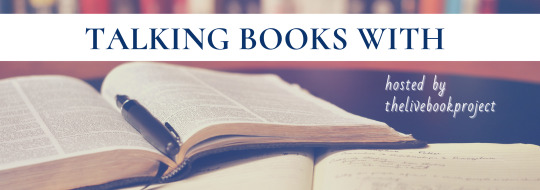
[What is this and how can I participate?]
Hi!
Today we discuss temporality, death of the author, and hot takes.
Important note: I haven’t changed or edited any of the answers. I’ve only formatted the book titles so they were clearer, but nothing else. Because I’m incapable of shutting up, my comments are between brackets and in italics, so you can distinguish them clearly.
------------------------------------------------------------

[Image description: a square titled “Know the blogger”. Name & pronouns: Amo, she/her; country: India, but studying in Canada; three adjectives to describe her: curious, brave & hopeful /end]
1. What is the most interesting thing you've ever learnt in a book?
I was reading Jeanette Winterson's Sexing The Cherry over the last winter break and I realised that temporality is as much in the writer's control as any other facet of fiction. Simultaneous time, quickening time, timelessness - all of those can be made real and I think seeing that in praxis was a very interesting and quite liberating thing to learn, as a writer!
2. Last book you loved?
Anne Carson's Short Talks.
3. Do you read classics?
I'm an English Major!
[Whoooops obvious question here!]
4. Thoughts on "death of the author"?
Death of the Author is a good thing to keep at the back of your mind while you engage with books in any way. Is it also a good thing to use instead of actual textual evidence? Less so. Any consideration of the author comes at the crossroads of a biographical reading and a historical reading. I think that's important to remember. I find the distinction in Wimsatt and Beardsley's “The Intentional Fallacy" a more useful tool to strip away the inessential. Also, I find great comfort in reading the Chorus in Henry V, and knowing that meaning is always constructed in a hermeneutic triangle.
[Some links in case someone (like me) got lost: death of the author, intentional fallacy, and hermeneutics]
5. Short books or long books?
Short books. Unfortunately, longer books intimidate me and I have commitment issues (it's not them, it's me).
Free space to say/add/recommend anything!
I will be dabbling mostly in Modernist poetry, Irish literature and some Chaucer this semester. If anyone wants hot takes on that, stop by my asks!
You can follow her at @suspension-of-disbelief and on her poetry newsletter.
--------------------------------------------
Thank you, Amo! I learnt a lot with you, haha.
Next interview: Saturday, 19th of December
17 notes
·
View notes
Text
Jamie Johnson 5x08 Review
Tonight was one of the best, if not the best, Jamie Johnson eps so far. Dillon faced some of his toughest obstacles yet in his coming out journey and we got some sweet Delliot moments. Let’s dig in!
This British kids soccer show continues to make history. We saw some very nuanced and mature discussions between Dillon and Elliot about being gay and coming out; how often on tv do two gay kids actually discuss their sexualities? Elliot gave Dillon some great advice and perhaps more importantly told Dillon that he was in fact brave and a winner on and off the pitch
You’d have to be daft to deny that Dillon and Elliot have crushes on each other after this ep. Seeing both Dillon and Elliot trying their best to look nice before meeting up with each other was cute and their handhold at the pitch was very sweet. Lots of soft smiles and longing glances and we even got a hug before Elliot left
Laquarn has confirmed that he’s not in any more S5 eps and doesn’t know if he’s back for the yet to be filmed S6. I can only hope he’ll come back. It would be a waste of great chemistry and an engaging character if Elliot was just meant to help Dillon with his sexuality before passing the torch to Ruby. He clearly left the door open for a future reunion when he told Dillon to call him when he was ready. Patrick confirmed in an interview today that he’ll be back for S6 and presumably Dillon will be playing for Foxborough or some other pro team. Being in a relationship would certainly be a good spur for Dillon to come out more publicly. And Elliot’s love of astronomy is a perfect set up for a date under the staahs
It’s true that the show has not really focused on ships in a big way; the most we’ve gotten was Boggy and Nancy and the low key Jack, Jamie, and Michelle triangle. But at the same time if Dillon can take Indira out and kiss Sienna then he should be able to date a boy he likes. It would be tragic if the closest Dillon gets to having a boyfriend or kissing a boy is Liam outing Dillon and claiming that Elliot was Dillon’s boyfriend and that he thought they were gonna kiss
And it’s a bit shady that Eric of all people is suddenly getting a female love interest out of nowhere. I just hope when the show eventually ends that it doesn’t turn out to be another Andi Mack where Cyrus was able to kiss a girl twice and go on dates with a girl and use the word girlfriend when none of that happened with a boy
Jamie Johnson really covered a lot tonight with Dillon. We had a very helpful run down of Dillon’s past with girls and the show carefully explains that Dillon never liked Sienna like that, he never wanted to kiss her, he never had a crush on anyone else like she thought, and he never liked Ruby as more than a friend (at least Duby shippers still have Alba and Liam for an Osborne-Simmonds ship). It wasn’t subtle but I think it was necessary to really drive home that Dillon is really gay and there’s no going back. And we got confirmation that Elliot was Dillon’s first crush, he’s obviously never beaten anyone up on this show and the way he phrases it makes clear that he’s never really thought about liking boys that way until very recently
And boy did this ep ever tackle homophobia. Graham Simmonds was seriously out of order this ep. He clearly didn’t want to believe Liam but Dillon using his aftershave already primed him to believe he was trying to impress someone, he just assumed it had been a girl. He really ran through the homophobe’s greatest hits collection: blaming Ruby’s gay parents, saying being gay was a choice, saying that being gay would end Dillon’s career, and disowning and kicking Dillon out for being gay. I suspect that quite a few of the parents watching JJ with their kids hold some of the same views or act the same way and this ep really holds up a mirror and reflects how ugly that kind of behaviour is. We also see Graham praising Dillon’s accomplishments and character right before Liam outs him which just exposes his hypocrisy even more. I do give the show credit for not shying away from Graham’s awfulness, it’s not going to be a quick change for him to suddenly accept Dillon and I’m excited to see his journey to atoning for his mistakes
Thankfully Mrs. Simmonds returned from her banishment to the shadow realm to tell Dillon she loved him and to tell him to return home. Shaun Duggan said he hoped this ep would be a lifeline for kids watching who may be living in homophobic homes (he also mentioned that CBBC rules don’t allow eps to allow on cliffhangers so he has to end an ep showing that the characters are at least physically okay)
It also challenges the audience, most of whom are probably young boys and men, as to whether they will suddenly stop liking Dillon just because he’s gay. It was a real gamble on the show’s part to have their fan favourite character and the effective second lead of the show come out as gay but it has the tremendous pay off of really making the audience question their assumptions and hopefully for some of them it will change their world views
Dillon and Elliot also discussed homophobia in sports. Dillon correctly notes that there aren’t any out players in the top professional teams. Shaun Duggan mentioned in a BBC interview that they like to bring on professional soccer players when they’re having the kids going through things but this time he wasn’t able to have anyone come on to help Dillon because there are no out players. So it falls to Jamie Johnson to basically create that reality themselves by telling Dillon’s story
Patrick Ward did a phenomenal job tonight and he really is the best of the kid actors. He’s mentioned in interviews that he did a lot of research by watching shows and movies with similar gay story lines. In particular his breakdown set to Behind Blue Eyes by the Who was very well done (and once again the show has great taste in music). And of course, Shaun Duggan did an amazing job writing this ep. He’s openly gay himself and that makes all the difference in bringing an authenticity and depth to this story line. On Andi Mack of the 5 textual gay eps only one, 3x11, was written by a gay man and not surprisingly that was the best written by far of those eps
We were 19 minutes into the ep before Jamie himself briefly showed up. And he was 5th in the credits tonight with Dillon and Elliot taking the number 1 and 2 spots. Actually this whole ep had a very small cast and only a few locations, it really helped focus this ep on Dillon. Having Dillon seek out Jamie is interesting in that they’ve been foils for each from the start. But also because it sends a message to have Jamie Johnson himself praise Dillon, it’s a way for the writers to speak directly to the audience through the title character
We’ll doubtless get some more development on Dillon’s story line in the rest of the season but they’ve done historic work so far. A lot of what we’ve seen so far: the depiction of homophobia, coming out to parents, and two gay kids discussing their sexualities has yet to happen anywhere on Disney. Hell this ep alone had more uses of the word gay than Disney has yet to have
I loved how extra the black and white boxing match cold open was. Not surprising that Dillon sees Mike as the supportive (and non homophobic) father figure he wishes Graham was
This was a big step backwards for Liam’s redemption arc tonight but at least at the end he didn’t seem to buying into his dad’s bullshit about them being the only men left in the house. Liam is by no means blameless but he’s also a victim of his dad’s emotional abuse and his pitting his sons against each other. That little meet up with Eric was interesting because they’re foils for each other in some ways and I’m curious to see what lies ahead for Liam and the U13 crew and for how Liam makes this up to Dillon
Looking Ahead:
Finally we get back to the real meat and potatoes of this show; online gaming! Looks like Mike is bored of gardening at the allotment and wants Jamie to get back into real soccer. We’ll see if Jamie makes into the online tournament
Again, not really sure why Eric suddenly needs Ayesha but we’re getting some Freddie anger over Eric choosing lasses over lads
Until next week Jamie Johnsoners
#Jamie Johnson#Delliot#Dillon Simmonds#Elliot#Ruby Osborne#Graham Simmonds#Liam Simmonds#Jamie Johnson Reviews
51 notes
·
View notes
Text
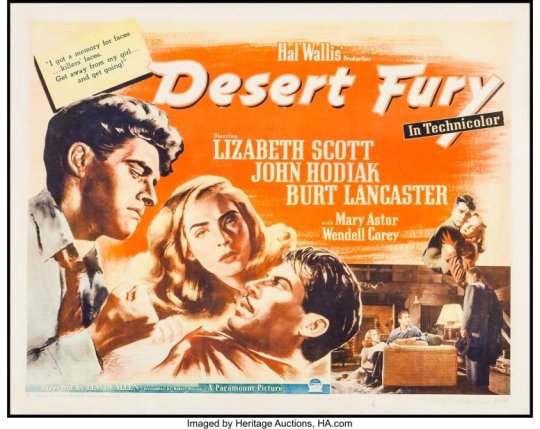
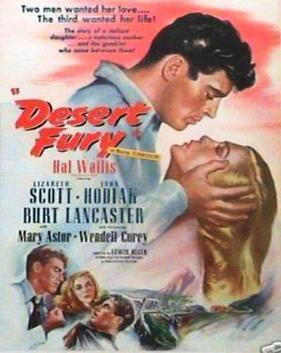
Burt Lancaster got his contract with Hal B. Wallis at Paramount on the basis of a test directed by Byron Haskin with Wendell Corey and Lizabeth Scott for Desert Fury. Lucky for him, the film was not ready to shoot for another six months and he was able to fit in Robert Siodmak’s The Killers(1946) for producer Mark Hallinger at Universal beforehand. Desert Fury started shooting two weeks before the release of The Killers but there were already whisperings of Lancaster as a big new star, and the whisperings were so loud that Hallinger gave him first billing and a big publicity build-up rather than the little ‘and introducing….’ title at the end of the credits that was then typical, and is indeed the billing offered Wendell Corey in Desert Fury as you can see in the poster above. Before Desert Fury started shooting, Hal Wallis knew he had a big fat star on his hands and that his part had to be beefed up so as to capitalise on it.
By the time the film was released on September 24th, 1947,, Burt Lancaster was the biggest star in the film. The Killers hit screens on the 29th of August 1946. As Kate Buford writes, Ít was an extraordinary debut for a complete unknown. Overnight he was a star with a meteoric rise ¨faster than Gable´s, Garbo´s or Lana Turner,¨as Cosmopolitan said years later (Buford, loc 1260). In New York the movie, ‘played twenty-four hours a day at the Winter Garden theatre, ‘where over 120,000 picture-goers filled the 1,300 seat theatre in the first two weeks, figures Variety called “unbelievably sensational.”‘ Brute Force was the fourth film Lancaster made, after I Walk Alone, but it was the second to be released, on June 30th 1947. According to Kate Buford, it too ‘set set first-week records at movie houses across the country’ (loc 1412).
Lancaster’s status as a star is reflected in the lobby card and poster above, where in spite of being billed third, what´s being sold is what Burt Lancaster already represented, the publicity materials giving a false impression that he is much more central to the narrative than is in fact the case. His image dominates in both, and even the tag lines are attributed to him: ‘I got a memory for faces…killer´s faces…Get away from my girl…and get going’, is the tagline in the lobby card. The text on the poster reads, ´Two men wanted her love…the third wanted her life.
In the ad below, he´s billed second, as ´the sensation of The Killers, Dynamite with the fuse lit’

When trying to recapture a past moment in relation to cinema, it´s often useful to look at trailers and other paratextual publicity materials. Trailers hold and try to disseminate the film´s promise to viewers. Of course, its purpose is to sell, to dramatise its attractions so that viewers will go see it. And of course, they often lie, dramatising not what is but what they hope will sell. That said, those promises, lies and hopes are often very revealing.
youtube
As you can see above, the trailer is selling melodrama — violent passions — in a magnificent natural setting filmed in Technicolor. Burt Lancaster’s name is only mentioned 39 second into the 1.41 trailer, after Lizabeth Scott with her strangeness and her defiance of convention and after John Hodiak with his secrets and coiled snakeyness. And Lancaster’s introduced as ‘hammer fisted’ Tom Hanson, erroneously giving the impression that this will be an action film. But note too that by the end of the trailer, Lancaster is given top billing.
According to Kate Buford, in Burt Lancaster: An American Life, Lancaster thought ‘Desert Fury would not have lunched anybody’, later ‘dismissing it as having ‘starred a station wagon’ (loc 1157). The film is really a series of triangles: Eddie (John Hodiak) and Tom (Burt Lancaster) are both in love with Paula (Lizabeth Scott), Fritzy (Mary Astor) has already had an affair with Tom who is currently pursuing an affair with her daughter Paula, Paula and Johnny (Wendell Corey) are both in love with Eddie etc. I have made a not-quite-video essay that nonetheless well illustrates the Johnny-Eddie-Paula triangle, surely one of the queerest of the classic period, which can be seen here:
Tom is really a fifth wheel in the narrative. But by the time the film started shooting, Burt Lancaster was already the biggest star in it. His part was beefed up to take his new status into account, scenes were added, According to Gary Fishgall, the film was based on a 1945 novel, Desert Town by Ramona Stewart, and ‘ Lancaster’s role was an amalgam of two of the novel’s characters: the embittered, sadistic deputy sheriff, Tom Hansen, and a likeable highway patrolman named Luke Sheridan. Neither character was romantically linked to Paula (p.55). But in the film, he ends up with Lizabeth Scott at the end. All these additions probably contributed to the film seeming so structurally disjointed.
In Desert Fury Tom, a former rodeo rider, just hangs around waiting for Paula to get wise to Eddie, leaving her enough rope to act freely, as he does with colts when taming them, but not enough so that she hangs herself, or so he thinks. Really, he’s extraneous. He gets to walk into the sunset with Paula at the end of the film but the film really ends once Paula and Fritzy kiss, on the lips. He certainly doesn’t get much to do during it, except for a couple of great scenes where Fritzy tries to buy him into marrying her daughter (above) and another bit of banter when she thinks he’s come to accept her offer (below). Mary Astor steals both scenes. In fact she steals everything. Every time she appears, her wit, weariness, intelligence, the intensity of her love for her daughter — she lifts the film to a level it probably doesn’t deserve to be in. But Lancaster is good. These are the only scenes in the film where he looks like he’s enjoying himself.
Tom is the closest the film has to a ´normal character’. Indeed, aside from the character he plays in All My Sons (1948) this is the closest he’d come to such a type during the whole of his period in film noir in the late 40s and which includes all of his films up to The Flame and the Arrow in 1950. Even in Variety Girl, which is an all-star comedy where he and Lizabeth Scott spoof the hardboiled characters they’re associated with, the surprise is that they’ve already created personas to spoof in such a short time (see below).
According to Fishgall, ‘Lancaster –billed third before the film’s title — acquitted himself well in the essentially thankless other man’ role. Still, if Desert Fury had marked his screen debut as originally planned, it is unlikely that he would have achieved stardom quite so quickly. Not only did the film lack the stylish impact of The Killers, but so did the actor. Without the smouldering intensity of the Swede and his first pictures’ moody black and white photography, he appeared to be more of a regular fellow, and guy-next-door types rarely become overnight sensations’ (p. 67).
In Desert Fury we’re told that unlike the drugstore cowboys who are now criticising him, Tom used to be the best rodeo rider there was but a while back, whilst wrestling a steer, he got thrown off and is now all busted up inside. Being ‘busted up inside’ is what all the characters Burt Lancaster plays in the late ’40s have in common. He thinks of returning to the rodeo all the time but knows he can never be as good. He used to be a champ, now all he can hope for is to be second best. He knows he ‘ain’t got what it takes anymore’. He’s in love with Paula and she knows it. But she doesn’t know what she wants. He think he does: ‘you’re looking for what I used to get when I rode in the rodeo. The kick of having people say “that’s a mighty special person” I’d like to get that kick again. Maybe I can get it with just one person saying it’. He will, but he’ll have to wait until the end of the movie.

But even in this, Lancaster doesn´t play entirely nicey-poo, true-blue, throughout, and his Tom is given moments of wanton bullying and cruelty where he gets to abuse Eddie just because he’s a cop and wants to. And it´s interesting that it´s that moment, which jives so well with the ´brute force´Lancaster was already known for, and which would attach itself to his persona for many a year, that is the one chosen for the trailer.
According to Robyn Karney, in Burt Lancaster: A Singular Man, ‘As the straightforward moral law officer in a small Arizona town who rescues the object of his affections from the dangerous clutches of a murderous professional gambler, Burt had little to do other than look strong, handsome and reliable. Despite Wallis’ much vaunted rewrites, the role of the Sheriff Tom Hanson remained stubbornly secondary and uninteresting, with the limelight focused on John Hodiak as the villain, fellow contract players Elizabeth Scott and Wendell Corey’ (p.31).
I mainly agree with Robyn Karney except for four points, two textual and stated above: the first is that even in this Lancaster is playing a failure, someone once a somebody that people talked about but now all busted up inside; the second is that that element of being ´busted up inside´leads to a longing that gets displaced onto Paula. If the rodeo is what made feel alive and gave him a reason to live before his accident, now it´s Paula, and the idea that she might also be an unobtainable goal leads to his outbursts of unprovoked violence towards the rival for his affections, Eddie (John Hodiak).
The other two points of interest are extra textual. Desert Fury is gloriously filmed by Charles Lang. A few years later, in Rope of Fury, Lang would film Lancaster as a beauty queen: eyelashes, shadows and smoke, lips and hair (see below):
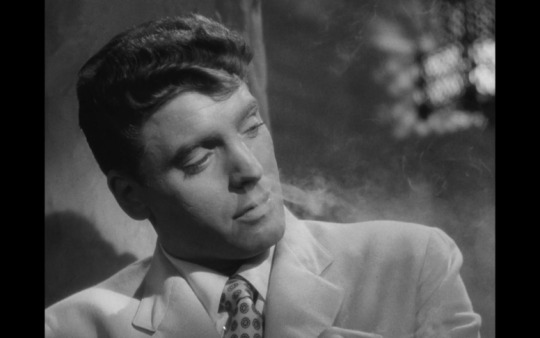
Here, even with his pre-stardom teeth and his bird´s nest of a hairdo, Lancaster sets the prototype for the Malboro Man:

He looks good in technicolour, and Lang brings out the blue of his eyes:
More importantly, the film visualises him, for the first time, as Wester Hero, a genre that would become a mainstay of his career from Vengeance Valley (1951) right through Ulzana´s Raid (1972) and even onto Cattle Annie and Little Britches (1981):

Desert Fury was not well reviewed. According to the Daily Herald ‘The acting is first-class. But except for Mr. Lancaster as a speed cop, the characters in the Arizona town with their lavish clothes and luxury roadsters, are contemptible to the point of being more than slightly nauseating’ (cited in Hunter p. 27),
The Monthly Film Bulletin labelled the film a western melodrama, claiming, surprisingly, that ‘The vivid technicolor and grand stretches of burning Arizona desert give a certain air of reality to the film’. Hard for us to see this thrillingly melodramatic film, lurid, in every aspect, evaluated in the light of realism. The MFB continued with, ´This reality is however counteracted by the way in which the sharply defined, but extremely unnatural characters act. Everything is over dramatised, and the title is a mystery in that the desert is comparatively peaceful compared with the way the human beings behaved…Lizabeth Scott is suitably beautiful as Paula and Burt Lancaster suitably tough as Tom. (Jan 1, 1947, p. 139)
Thus, we can see that on the evidence above, the film was badly reviewed, Time magazine going so far as to call it, ‘impossible to take with a straight face’ (Buford, loc1293). But Burt Lancaster´s performance was either exempted from the criticism or its faults where attributed to the film rather than to himself. More importantly still, the film was a hit, Burt Lancaster´s third in a row. Finally, as I´ve discussed elsewhere, the film is now considered by many a kind of camp classic, a leading example of noir in technicolor as well as arguably the gayest film ever produced in the classic period.
José Arroyo
Burt Lancaster in Desert Fury: Third Film, Fifth Wheel Burt Lancaster got his contract with Hal B. Wallis at Paramount on the basis of a test directed by Byron Haskin with Wendell Corey and Lizabeth Scott for…
#Burt Lancaster#Desert Fury#Lewis Allen#Lizabeth Scott#melodrama#noir#post-war cinema#post-war stardom#stardom#Third Film Fifth Wheel#westerns
2 notes
·
View notes
Text
So About That Slap
So I was originally just gonna do this as a comment on @thankskenpenders‘ post but
a) I’d already reblogged that post twice to highlight the on-point comments from @robotnik-mun and @starsandpawprints so doing it yet a third time with my own comments felt kinda tacky? Plus their comments wound up feeding into my own so doing this as my own post means I can refer you more easily to both of what they had to say (read ‘em here ‘n’ here respectively)
b) This got kinda super-duper long
And just to preface this with some stuff that I do think is important for context
1) I do not now nor have I ever condoned or approved of the way Jon Gray or Karl Bollers were treated over what happened in this issue; the harassment they’ve both faced even now about this plot point is utter bullshit on every level and I want to be crystal clear that none of what I say or how I feel here is meant as an attack on them at any level
2) I’m very aware that this is older than Old News; the comic is literally over, the moment itself happened 15 years ago, and even at the time it wasn’t really The Biggest Deal no matter how the fandom took it. This isn’t meant to be any sort of Definitive Final Word or whatever on the whole thing; it isn’t even necessarily meant to be Me Venting My Anger. But I do have Feelings on it even all this time later and hey! Since the topic’s come up again? I felt like putting them down.
All that having been established? Let’s dive right in!
So I’ll say upfront I actually agree with a lot of what TKP has to say on the matter! Not just that the reaction to it as a whole was ridiculously over-blown at the time (and I will admit upfront that at the time my feelings on the topic were pretty raw), but that textually speaking, we’ve been building up to this for a while! On The Page, there is in fact a lot that informs why Sally does what she does the way that she does (and for that matter I actually do think Jon Gray’s art for the scene really works; I know some have complained that the zippy cartoony look undercuts the drama of the scene but I actually think it places the exact right emphasis on the intensity of the emotions and the violence with which they swing as the scene progresses)! For that matter I agree a lot with what @starsandpawprints said about how brutally unfair the situation is to Sally when you actually step back and take a look at the circumstances surrounding it! And to be clear? I’m a big Sally fan; not only am I already inclined to relate to and sympathize with her character but I think that notion of Sally struggling with these exact sorts of personal issues is a fascinating and worthwhile story to tell with her that could have lead her down some interesting and meaningful paths.
However, I also think @robotnik-mun is onto something when he points out that the overwhelming majority of the audience saw Sally’s actions as unsympathetic and unreasonable. Only I’d take it one step further: the problem isn’t simply one of perception, but of framing.
For one thing? As much as we’re all picking up on how ill-considered Max’s choice to put all of this on Sally’s head now of all times is, nothing within the comic itself actually suggest that this is meant to be taken as a poor choice; although Alicia airs her concern over the matter, nothing in the comic suggests that Max’s confidence that Sally can handle it is meant to be regarded as unfounded or foolish (we even get an absolutely-adorable shot of Sally looking super-happy and flashing the V-for-victory sign to go with it), even as it does ultimately prove to be mistaken. Likewise, there really isn’t anything in this comic or the prior comics that specifically goes into detail about the strain Sally’s relationship with the rest of her friends is under; we may perhaps infer that fact if we’re so inclined from the bare facts but the truth is nothing in the “Home” arc thus far has really delved into it with any real detail. Which makes sense! Sally isn’t our point-of-view character here (which poses a problem of its own admittedly but we’ll get to that), we only have so much space in any given issue of this comic, it’s easy to see why that element wouldn’t be deemed relevant enough to go into detail on. It just also means we the reader aren’t given any reason to view that as a factor in Sally’s emotional state of being; all we have to go on, all the story focuses on, is her fear of losing Sonic again.
And the thing is? That’s kind of just how she’s been written for a while now.
Again: at the strictest level of what’s on paper, the idea that Sally is suffering from PTSD (and quite possibly Depression, something the fantastic @sally-mun has explored in some really interesting ways) is pretty easy to support, but in the framing I’m not entirely sure it scans. This exact kind of Emotional Reaction when it comes to the idea that she’ll lose Sonic has in fact been THE go-to Thing Sally has been doing for the last few years in the comic at this point; what happens with The Slap really doesn’t seem all that far removed from how she acts during all that asinine Love Triangle Nonsense with Mina right up to her teary farewell to Sonic in #125. Which in turn makes it feel a lot less like this is the repercussions of deep-seated trauma rooting their ugly head but rather that as far as the writing is concerned this is just sort of how Sally handles this stuff when it comes to Sonic, which is to say poorly. Indeed, even the way she’s restricted to staying in Knothole away from the fighting feels less like an example of her parents being unfair, and more like the entirely right course of action to protect her from her unstable Emotions, No Matter How Hard It May Be.
In other words, I don’t necessarily think this is a case of us being meant to sympathize with Sally that we just misunderstood; I’m really not convinced we actually are meant to sympathize with Sally here.
Which isn’t to say that one can’t! Again, there’s a ready-made case that one should! It also doesn’t mean I think this story hates Sally and wants us to hate her too. But a story is more than just raw data, and whatever we might be able to infer from that data, what reactions and feelings the story wants from us comes down to how it attempts to guide us through that data, and in this case it is really hard for me to see that being done in a way that is favorable to Sally much at all. We as the readers intrinsically know that she cannot be right to ask Sonic to stay: Sonic cannot be meant to Not Be Out Fighting because he’s the Main Hero of the book and that’s just flat-out what he does, to say nothing of the fact that it’s what he wants to be doing, and as the main character his is the point of view we’re generally meant to take, with the book again doing nothing to indicate that we shouldn’t in this case. Meanwhile, with no real reason to think of all the other factors that could be influencing Sally’s state of mind here, we’re really only left with the one explicit reason she offers, which is that she wants Sonic to stay with her where he’ll be safe. Not in and of itself an unfair feeling, but in this context? With a War going on that the rest of the story keeps insistently reminding us about? As part of a story where we saw that a single year of Sonic’s absence was enough to drive the Freedom Fighters to the brink of destruction? It’s exceptionally easy to read it as Over-Emotional Sally putting her need for Romantic Security over the safety of the rest of the planet. And while I don’t know that I think the story quite intended it to land that harshly? It’s really easy for me to feel like it at least wants us to be thinking in that direction.
Because the thing is we get zero insight on what else it is that drives Sally to this point otherwise. @thankskenpenders put it really nicely during a look at #88: “for a long while now, the main action the writers have permitted Sally is a series of sudden emotional outbursts. We rarely see the action from her perspective, as Sonic is the protagonist and the audience viewpoint character. So instead of being about Sally’s emotional struggles, it becomes about how Sonic can never please Sally.” By much the same token, what could have been a story about Sally finally breaking under the myriad emotional and psychological pressures that have been building up inside of her in the year she spent stewing in the belief that Sonic was dead while the rest of the world slowly but surely fell apart without him instead becomes a story about how unfair it is for Sally to expect Sonic to be something he fundamentally isn’t simply to make her feel better. We aren’t given her point of view; nothing prior to this story (and only one thing after this story prior to Flynn about which I have Decidedly Mixed Feelings but I’m trying to keep us focused only on what has already happened up to this point so I won’t go into that here) attempts to delve deeper into her mental or emotional state at this point in time; the framing of the story provides us no context to Sally’s reaction save the apparently-overwhelming strength of her Romantic Attachment to Sonic. Is that basically business as usual with this comic? Absolutely; that TKP quote above is in reference to an issue published four whole years prior to this one!
But that’s precisely the problem for me.
The Slap stands out as especially bad to me because it is the final breaking point where all the problems baked into the approach the book has taken to writing Sally over the years-simultaneously unapproachable and out of focus as a Main Character and yet constantly present, rarely if ever allowed to actually do anything of consequence but always available for a Big Emotional Reaction-came home to roost. It was a culmination of the bad direction they’d been taking her in for a long time, and as a result it felt the most difficult to reconcile with the character as I’d understood her; back in the day this marked the first point at which I basically dropped out of the comics for a while, keeping my finger on the pulse via online scans and fan reviews but absolutely not going out of my way to pick up and buy new issues as I’d been doing consistently for about as long as I’d been a fan prior to that point, and it was because I really just didn’t understand what they were doing with Sally’s character, my favorite character, anymore at all. These days I’m more sensitive to the Behind The Scenes realities that drove this choice, and also just older and more mature in general such that it’s not quite as upsetting. But I won’t lie (in case the preceding near-2000 words didn’t convince you already): even now I think it’s a pretty bogus choice all things told. One that could have worked? Sure! One that did? I don’t think so at all.
24 notes
·
View notes
Note
In "Romeo and Juliet," is there any clear hint of how long the Capulets and Montagues have been feuding? I've always taken "ancient grudge" to mean that the feud has gone on for generations. But I just found a book envisioning the feud as having been started by the current Lords Capulet and Montague, over some rivalry (maybe a love triangle) in their youth. Your observation that the two patriarchs view the feud as being chiefly between themselves seems to reinforce this idea. Or does it?
This is one of those points that are quite difficult to answer without speculation. As a textual critic I tend to think that we need to take the text at face value, so if it says it’s an ancient grudge, then it’s probably an ancient grudge, as you say, which has probably gone on for generations. Montague repeats the term as well in the first act, when he asks Benvolio ‘Who set this ancient quarrel new abroach?’ (1.1.102). It may be that the heads of the Montague and Capulet household have a particularly strong grudge against each other, but then, there’s the possibility that each generation takes out its enmity on the equivalent member of their own generation from the other house. So, for instance, Lord Capulet and Lord Montague feel more enmity towards each other than they feel towards other members of the house, just as Tybalt singles out Romeo as his foe. As insolent as he is, it’s hard to image Tybalt challenging Lord Montague. I don’t think it’s worth speculating about how the feud started, given that the text doesn’t mention it.
Having said that, there is also the implication that Montague and Capulet are quite old, hence why Lady Capulet says ‘A crutch, a crutch! Why call you for a sword?‘ (1.1.74) when her husband tries to join the foray at the start. Four times in the play the word ‘ancient’ is used to refer to old age (a common usage in Shakespeare) rather than to a longer generational period. The prince, at the beginning, refers to ‘ancient citizens… with hands as old’ (1.1.90-92), which contextually makes clear that it’s about age; Friar Lawrence talks about how Romeo’s groans for Rosaline are ‘yet ringing in mine ancient ears’ (2.3.70); and the nurse is referred to as ‘ancient lady’ (2.4.137) by Mercutio, ‘Ancient damnation’ (3.5.236) by Juliet. The other usage is also present, as when Friar Lawrence calls the Capulet tomb an ‘ancient vault’ (4.1.111), and epithet repeated by Juliet who says it is ‘a vault, an ancient receptacle / Where for this many hundred years the bones / Of all my buried ancestors are packed’ (4.3.39-41). As the context makes clear, ‘ancient’ here is the one common in modern usage. What all this boils down to is that ‘ancient’ could refer to a single generation, but the different usage does suggest that ancient means a long time when referring to things, and old age when applied to people.
In Shakespeare’s primary source, Arthur Brooke’s (1562)The Tragicall History of Romeus and Juliet, the prologue (’Argument’) uses ‘ancient’ to refer to the families themselves rather than the feud, and while it’s not entirely clear, there’s a stronger suggestion that the feud starts as a trivial matter between the two heads of the house. By changing ‘ancient’ to refer to the feud, Shakespeare alters a key detail and makes it even less clear. On some level, this makes me think it doesn’t really matter. The point is to establish that there’s a tense atmosphere of pervasive hatred and bloodshed that has been going on long enough for it to have bred factions and affected civil society.

93 notes
·
View notes
Text
Carl = Charlie = Victor?
The appearance of Victor Trevor in TFP as a little pirate friend from Sherlock’s childhood, who got trapped in a well where he drowned, is intriguing to say the least; it doesn’t seem to connect with anything else we had seen in the show, except for the dog Redbeard. But Victor is not a new element for Sherlockians over the world, and I think this meta by @sagestreet gives an excellent explanation of how Victor fits into the show on a meta level. But what about the textual and subtextual levels? I imagine this has been brought up before, but something just seemed to click into place, so I’ll just throw my thoughts on it out here anyway. There are some pieces of the puzzle that stands out to me, so let’s try to put them together into something - more or less - coherent.
So, for a start: what exactly do we know about Victor Trevor from ACD canon (The Gloria Scott, GLOR)? I’ve highlighted certain facts that caught my attention in this recollection (Sidney Paget’s illustrations are all found here):
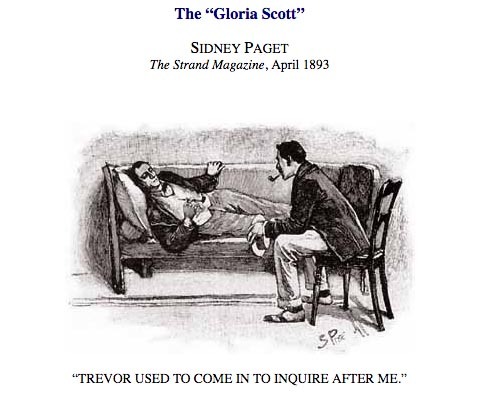
Well, basically this:
The story about Victor Trevor was Sherlock Holmes’ first case ever.
Sherlock got to know Victor when they were both at college.
They became friends (Sherlock’s only friend) because Victor’s dog bit Sherlock so he ended up in a sick bed where Victor spent a lot of time with him.
Victor came from a rich family, and Sherlock spent a summer with Victor and his father (Trevor senior; a “squire”) at their large, old-fashioned house with high chimneys.
In what is described as his ‘first case’, Sherlock deduced (parts of) and eventually learned what had happened to Victor’s father, involving a ship with convicts (Trevor senior among them), a mutiny, explosions, killings, shipwreck and Trevor senior ending up hiding under false name for the rest of his life.
Hudson, a surviving criminal from the event, showed up at the mansion, getting drunk and blackmailing Victor’s father with the threat of exposure, which would forever sully his and his family’s name.
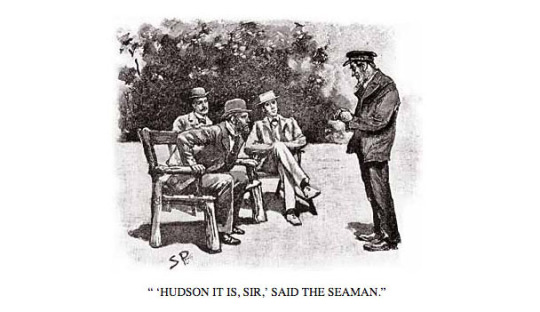
Victor’s father's real name was James Armitage, the initials of which Sherlock discovered from his secret tattoo. He got suspicious of Sherlock, who could deduce his criminal past, which led to Sherlock leaving the place.
Victor showed Sherlock a message with a skip code that had meant imminent danger to Trevor senior. It’s a threat of exposure, the fear from which he never recovered; it gave him a stroke that lead to his death.

The skip code read, after deciphering: “The game is up. Hudson has told all. Fly for your life.”
After his father’s death, Victor ended up “heart-broken” in a tea plantation in India. Sherlock and Victor never seemed to have met again after that.
This is Sherlock, many years later, telling John about the message Victor had him decipher:
“Yet the fact remains that the reader, who was a fine, robust old man, was knocked clean down by it as if it had been the butt end of a pistol.”
“You arouse my curiosity,” said I.
Now, this does not bear the slightest similarity to what we learn about Victor in TFP, does it? But what if his story is indeed included in BBC Sherlock, but not (just) in TFP; what if the story about Victor is scattered all over the episodes in the show? And what if this scattered story about Victor is meant to give us clues about the emotional trauma in Sherlock’s past that made him shut down his feelings? Under the cut, let’s take a closer look at some elements of the episodes from this perspective, to see if this idea would make any sense:
ASiP
This is only the first episode of the show, but I think some traces of Victor might be found already here. James Phillimore, 18, who seemed to have some problems with internalised homophobia (judging by how he refused to share an umbrella with his friend in the heavy rain), was found dead near a sports centre, seemingly having committed suicide with a poison. But Sherlock’s investigation makes it clear that Phillimore is one of the victims of serial-killer cabbie Jeff Hope. Phillimore was a student at Roland Kerr’s College for Further Education, an old building with Victorian design (see my recent meta + additions for a more in-depth analysis of the significance of this college).
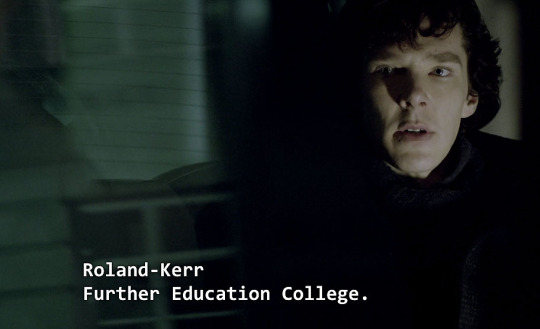
In canon James Phillimore figures as an unsolved problem in The Problem of Thor Bridge (THOR):
“A problem without a solution may interest the student, but can hardly fail to annoy the casual reader. Among these unfinished tales is that of Mr. James Phillimore, who, stepping back into his own house to get his umbrella, was never more seen in this world.”
(The main plot of THOR, however, is a triangle drama where one of the involved parts commits suicide but tries to arrange it so their rival is accused of murder.) Roland Kerr’s college is also where Jeff Hope takes Sherlock to talk to him and make him kill himself at the end of ASiP, and where (supposedly) John shoots Hope. The college is also represented as Sherlock’s Mind Palace in HLV, where he finds comfort and strength to survive a gunshot by mentally summoning his childhood’s dog Redbeard.

TGG
Several people have pointed out, about this last episode of S1, that Moriarty’s five “Greenwich pips” transmitted by a pink telephone (=heart metaphor) in TGG represent the five series in BBC Sherlock. Moriarty’s ‘great game’ with pips in it begins with an explosion close to 221B.
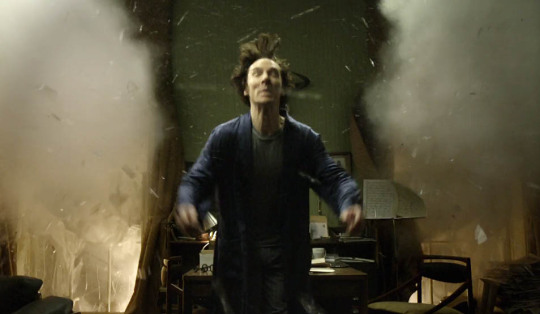
The case of Carl Powers is what comes from the first pip, but it also ties into the fifth and final pip. In the first pip we learn that the death of Carl Powers was Sherlock’s first case, an he has saved a press clip of the boy from this case:
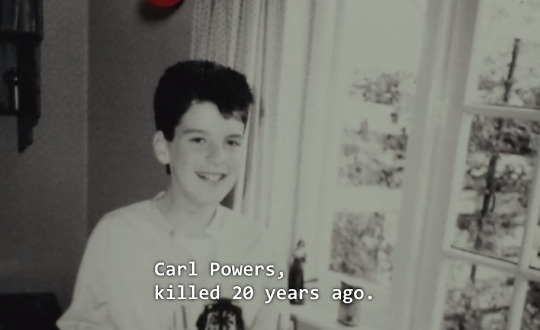
In TFP, however, we’re told that The Musgrave Ritual was his first case. None of them is canon consistent, however, since ACD told us that Holmes first case was The Gloria Scott. According to Sherlock’s discoveries in TGG, Carl was a young swimming athlete who was poisoned by Jim Moriarty, which lead to him drowning in the pool. The official version from the police, however, was that Carl died in the water due to some sort of ‘fit’. The case of the fifth pip takes place at the swimming pool where Carl died.
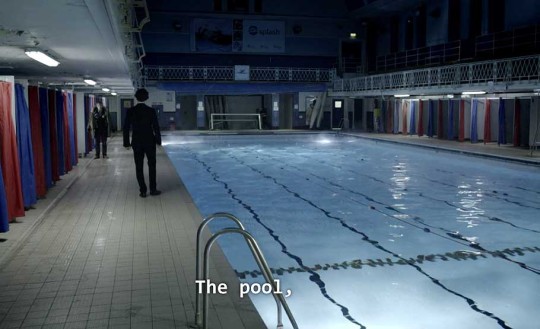

Strangely enough, Sherlock makes an appointment with Jim exactly there, and this pool is also where Jim tosses the valuable memory stick that Sherlock has recovered. The Carl Powers case was never solved, though, and the Bruce Partington memory stick was never recovered. Which means, that if the fifth pip is foreshadowing S5, the Carl Powers case might come up again in S5.
THoB
This whole episode of S2 is about a guy, Henry Knight, who is haunted by a childhood trauma in which he lost his father. Sherlock seems particularly engaged in this ‘cold case’ with modern times consequences. For the first time we see him shaking with fear after having (supposedly) sighted the same monstrous ‘hound’ that has affected Henry since he was a boy.
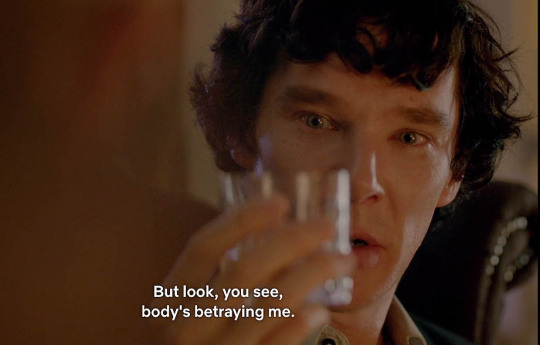
But it turns out that “there never was any monster”; Henry’s father was killed by his own friend. (Please read @sagestreet‘s brilliant ‘Follow the dogs’ meta series for subtextual explanations of how the ‘hound’ mythology represents homophobia, and many other very interesting ideas). Another important fact that we learn in this episode, is that Sherlock considers John his only friend.

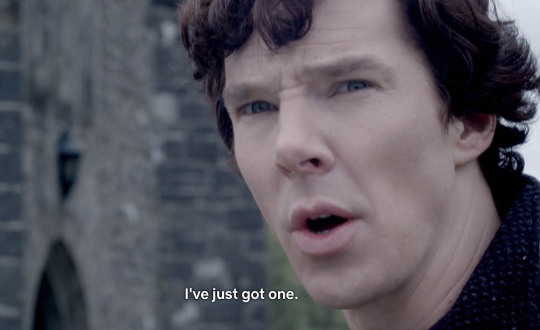
TRF
In one of Sherlock’s cases in the last episode of S2, he and John visit a boarding school, from which two children have been kidnapped. Sherlock’s sudden rant against Miss MacKenzie is a little bit weird, though, isn’t it?
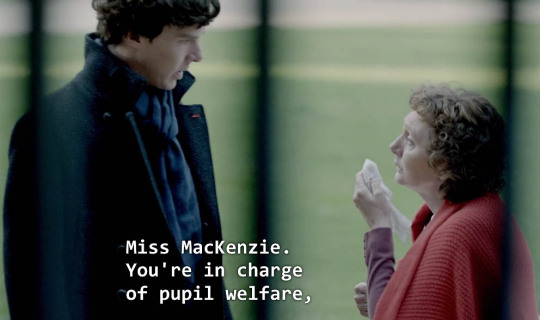

Moriarty has poisoned the children by luring them to eat toxic chocolate. In this episode Sherlock and John are very much exposed and speculated about in the media. Suddenly Sherlock is accused of the kidnapping and Moriarty blackmails Sherlock by threatening John, which (supposedly) leads to Sherlock killing himself (but he actually disappears by faking his suicide).
TEH
in the first episode of S3, when Sherlock comes back from the dead, he immediately deduces that John’s fiancee ‘Mary’ has a secret tattoo and is a liar:
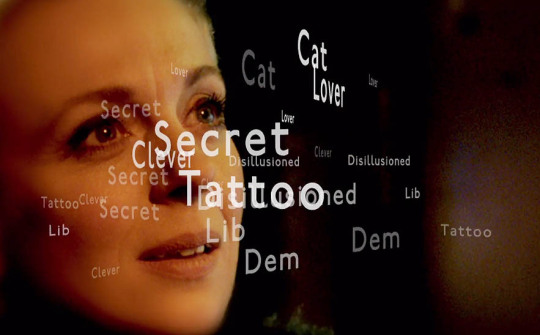

Later, in HLV, it turns out she has been hiding under a false name and lied about her criminal past and has many deaths on her conscience as an assassin. Sherlock also observes that ‘Mary’ can recognise a skip code; in fact there’s a skip code sent as a warning about an imminent danger to John.
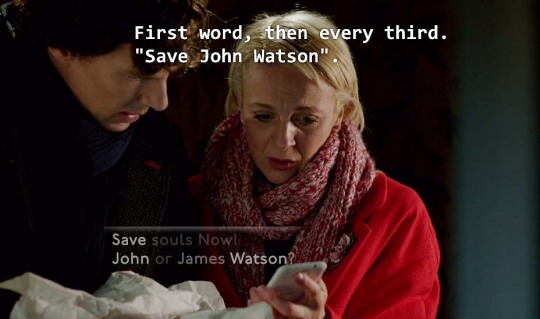
Sherlock deciphers it, and the resulting message is “Save John Watson”, which leads him to where John is trapped in a bonfire.
HLV
At the end of the last episode of S3, John is threatened by the ruthless blackmailer and media magnate CAM, who flicks John’s face in front of Sherlock and threatens them both with exposure in his news paper.
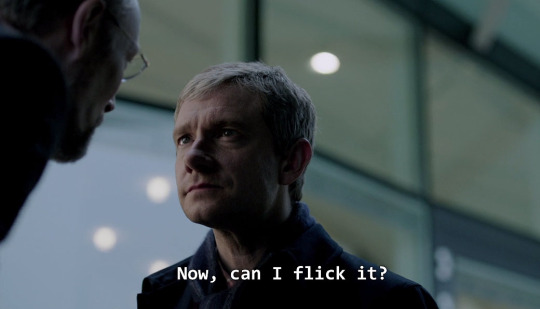
I’ve written about this in The Threat of Exposure and other metas about media’s role in BBC Sherlock (X, X).
TST
In the first episode of S4, young Charlie Welsborough is found dead in his own car outside his rich (and Thatcher-loving) parents’ mansion, when his car is hit by another car and explodes.
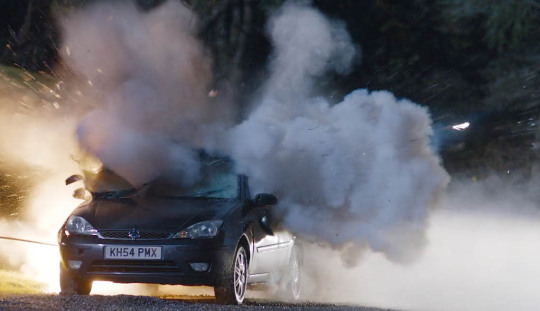
Rather than (as is his MO in S1 and S2) investigating the crime scene to find out what really happened, Sherlock quickly concludes merely from police data that Charlie had made himself invisible by disguising as a car seat.
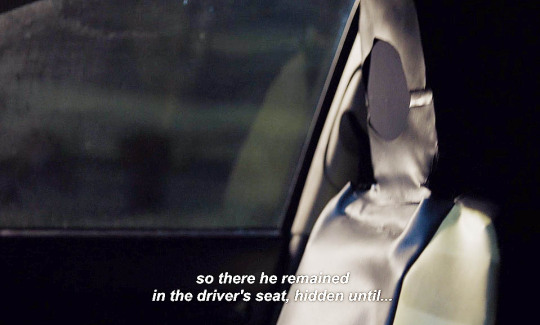
According to Sherlock, instead of surprising his father by coming out of the car, as he (supposedly) had planned, Charlie died instantly from some sort of ‘seizure’, and sat there dead until the car exploded a week later. (Added to this case is also the smashing of a Thatcher bust, which later in TST leads to Sherlock discovering a valuable memory stick).
What bothers me however, apart from the fact that Sherlock’s explanation is quite illogical, is the subtextual implications: a) Charlie is queer-coded,

(the rainbow is just one of the clues) and b) dying inside one’s own car like that is suspiciously similar to a common suicide method. The idea that Charlie (supposedly) died from a “seizure” ties him closely to Carl Powers - his namesake in Sherlock’s first case, who according to the police died from a “fit” in the water. And Sherlock was reminded of Carl’s case directly after an explosion in TGG. Only this time it’s Sherlock who jumps to conclusions about a ‘seizure’, rather than the police. Which makes me believe that this event represents something entirely different inside Sherlock’s Memory Palace/Mind Theatre. Something dwelling in Sherlock’s subconscious, possibly involving a young (boy)friend ‘coming out’ to a conservative, homophobic father in the Thatcher era. And a possible suicide (or at least disappearance?) by said (boy)friend. Victor Trevor travelled to India in canon, while Charlie Welsborough was traveling in Tibet before he died. (Sounds a bit similar to Sherlock traveling in Tibet/Himalaya during the canon hiatus/MHR doesn’t it?).
TFP
In this last episode of S4, theres an explosion at 221B Baker Street, caused by a ‘patience grenade’:

Sherlock and John suddenly appear on a ship as pirates:
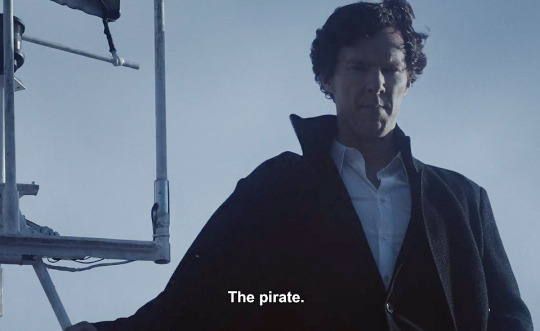
They take over the boat and force their way onto Sherrinford Island where Eurus is imprisoned. This is also the only episode where Victor Trevor is mentioned, but he’s not a young man; he’s supposed to be a kid from Sherlock’s childhood - his best (and only) friend. Victor is very much presented as a John mirror; short blond hair, checked shirt and trapped in a well.

Sherlock and Victor were playing pirates outside Sherlock’s childhood home, the mansion Musgrave Hall, which apparently had high chimneys.

Sherlock was called ‘Yellowbeard’ and Victor ‘Redbeard’. In TFP we also see John and Sherlock hijacking a fishing boat and telling the captain that they’re pirates. In spite of both Sherlock’s dog Redbeard and Victor figuring in early snippets of Sherlock’s dreams in S4, Sister Sentiment Eurus later tells him that they never had a dog;
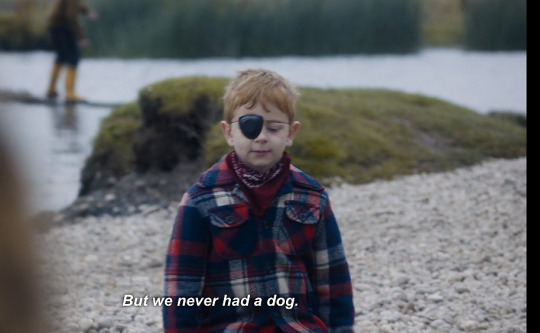
Sherlock was not allowed to have one, since their father was ‘allergic’. We also learn that Eurus (Sherlock’s supposedly forgotten sister) killed Victor by trapping him in a well, because she was jealous that her brother Sherlock had a friend and she was not included in their games. Nothing more is explained about Victor, however (and I feel sure this storyline isn’t over yet).
Victor never came out of the well; he drowned there, but at the end of TFP John seems to be trapped in the same well as Victor, and discovers his bones in it. In the last minute, with a raising water level, Sherlock saves John from the well by solving a puzzle and thereby finding and embracing Eurus.
Conclusion
So, I do believe that we have most of the ingredients of canon’s story about Victor Trevor and the ship The Gloria Scott scattered over the whole show: colleges and boarding schools; a dog; two best friends who were separated; a young man who might have committed suicide, a homophobic father; a mansion; a secret tattoo; a skip code with an important message; someone seemingly innocent with a criminal past; a ship with pirates (= mutinous criminals); dangerous explosions; blackmail and threats of exposure; a trip to Asia. And the back story is merged with the show’s present. What all this might mean for the next series, we can only speculate, but I do think that we have a pattern here.
Thanks to everyone who has had the patience to read all this. :) Tagging some people who might be interested: @sarahthecoat @tjlcisthenewsexy @ebaeschnbliah @fellshish @gosherlocked @loveismyrevolution @sagestreet @sherlockshadow @darlingtonsubstitution @devoursjohnlock @tendergingergirl @kateis-cakeis @csi-baker-street-babes @88thparallel @timilina @dieseldrakilis @sherlock-overflow-error @elldotsee
#victor trevor#the gloria scott#subtextual reading#Patterns in BBC Sherlock#charlie welsborough#carl powers#Sherlock's first case
56 notes
·
View notes